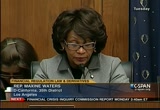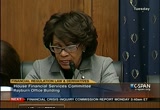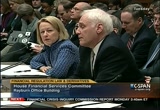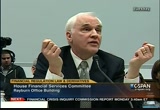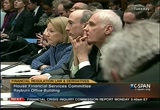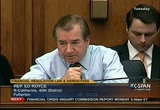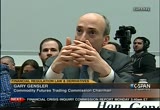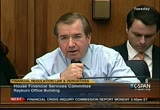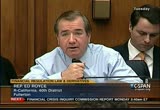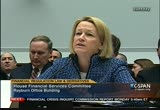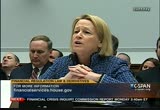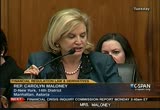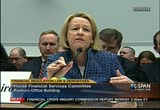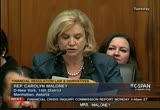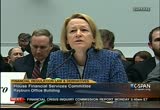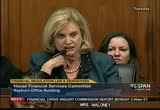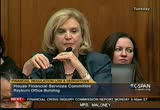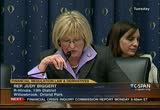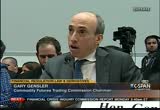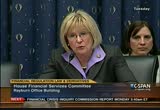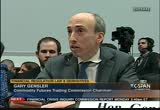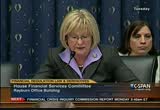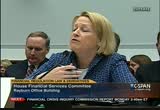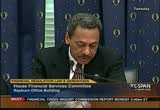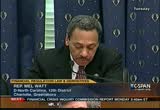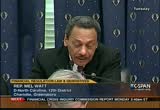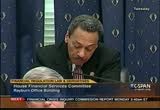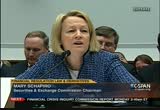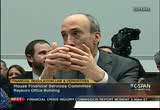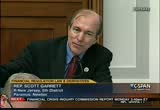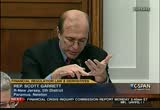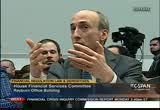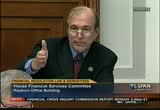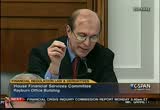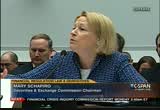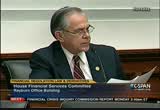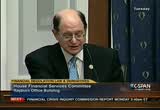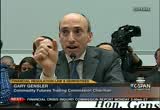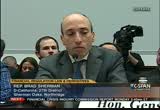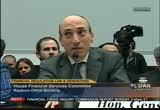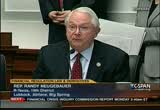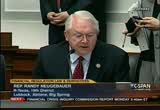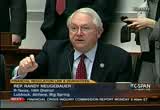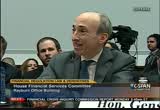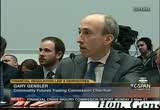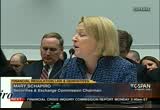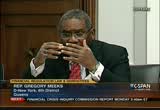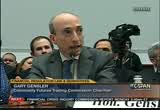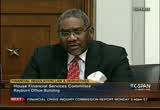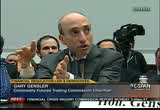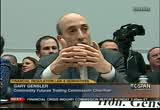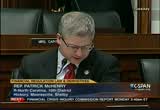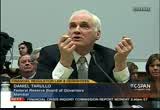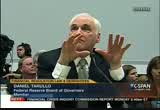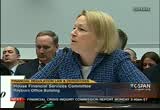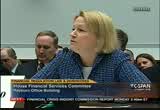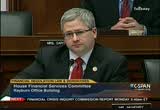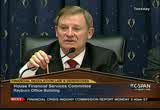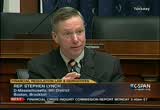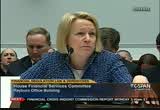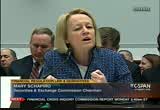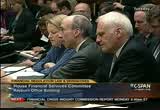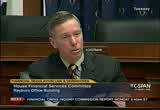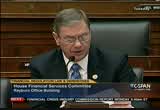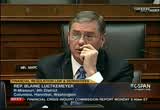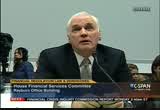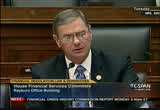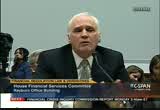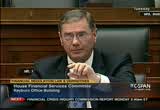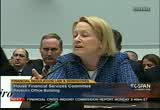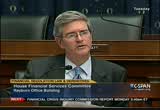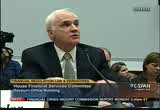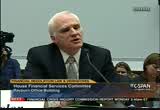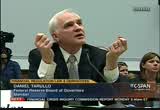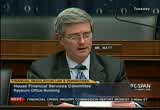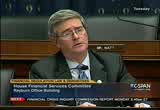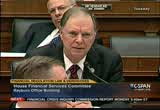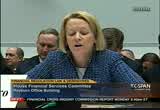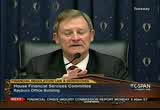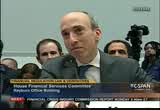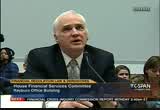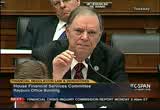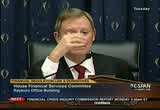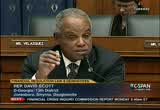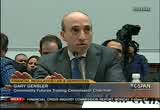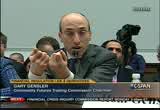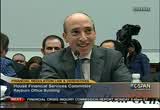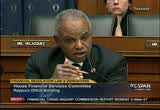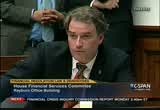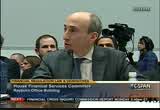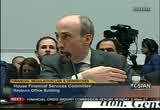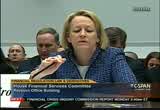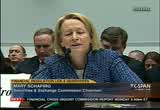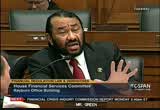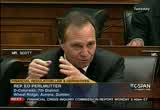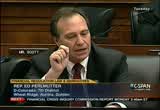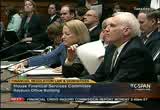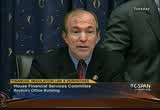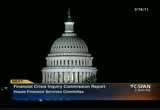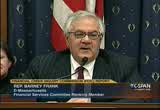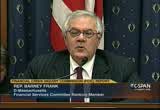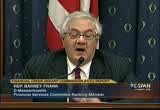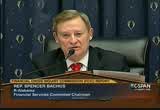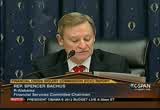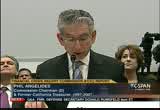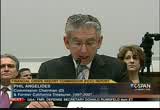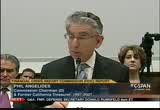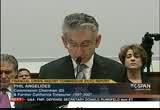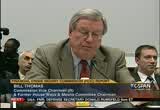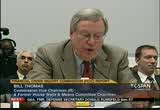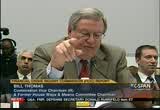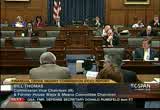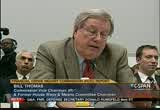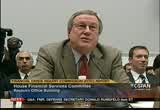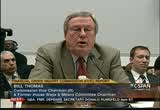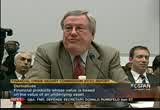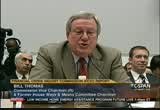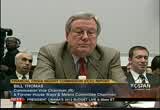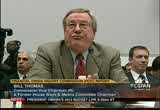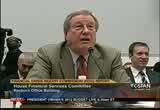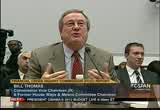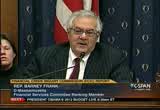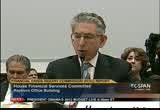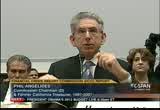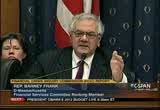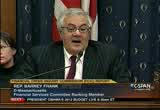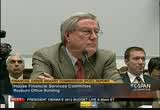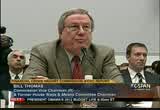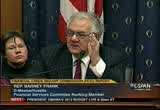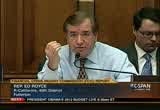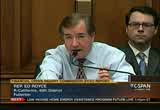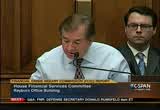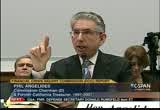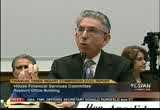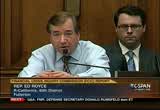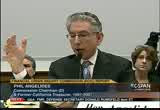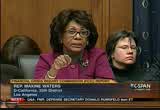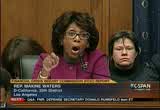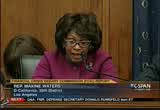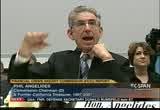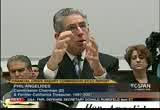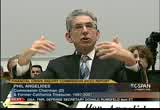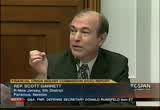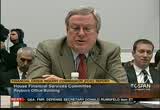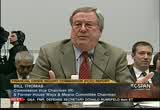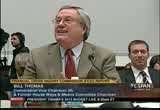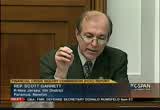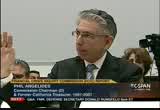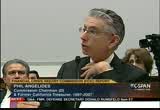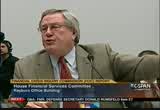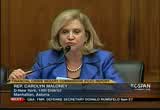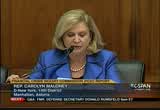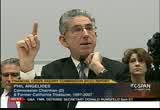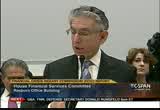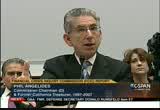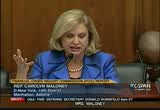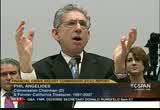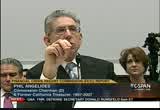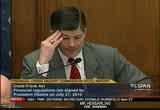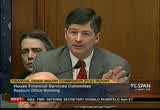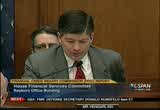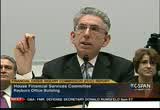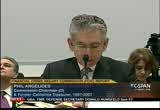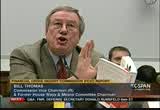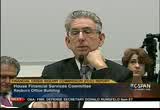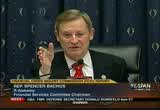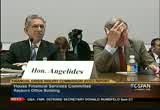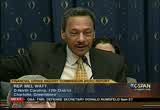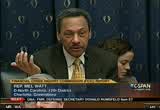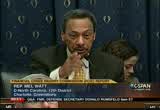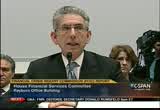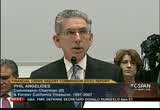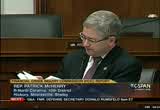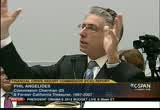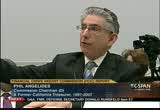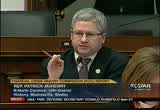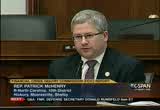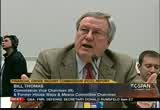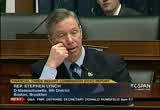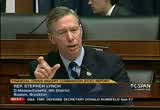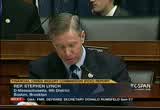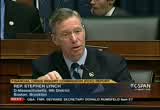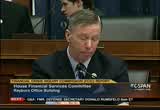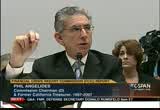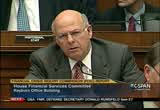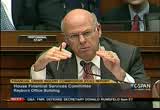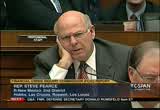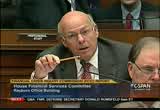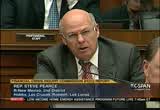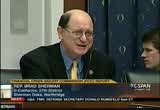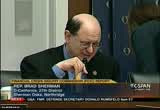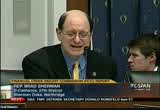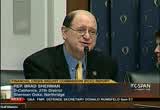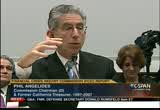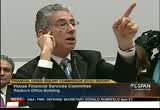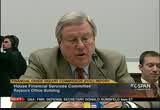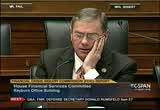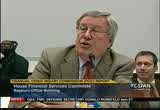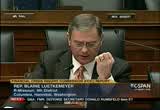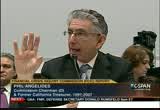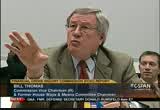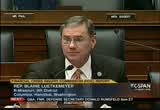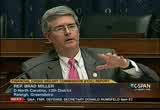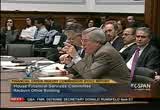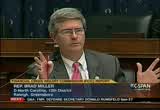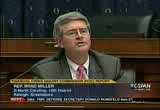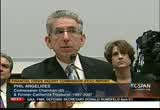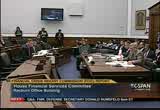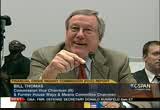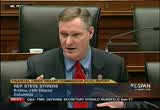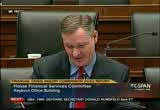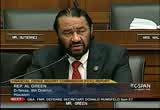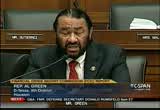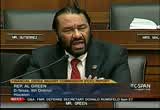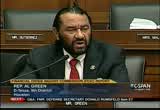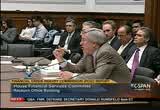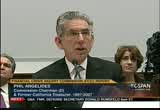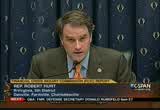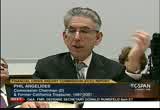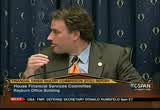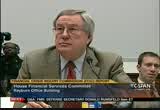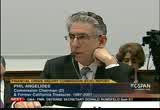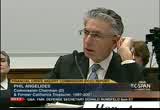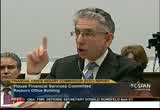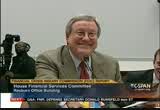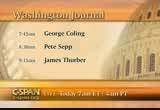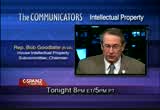tv C-SPAN Weekend CSPAN February 21, 2011 2:00am-6:00am EST
2:00 am
claims that the margin requirements in dodd-frank will result in 100,000 fewer jobs. let me ask each of our witnesses today, first schapiro>> that wa? yes. i did have an opportunity to look at it. >> have you seen the study? >> i read this survey last night around midnight on the web. >> have you seen the study? >> i did read it, yes. >> can you tell us how effective regulation of the derivatives market can actually save jobs? >> i think that at the core, we lost over 7 million jobs in this country when the financial system and regulatory system failed. swaps were part of that. it makes the system safer for america. it helps end users have more
2:01 am
transparency and lower competition in the marketplace. as long as we handle margin and many end-user issues, which we want to work with you on, transparency, competitions, and markets. >> mr. shapiro, i agree that failed regulation caused a lot of jobs. how can better regulation cause a loss of jobs? can you discuss a little bit how better regulation can save jobs? >> effective regulation can promote capital formation, which is the creation of jobs. when companies feel they can go to the market and raise capital, stocks will be priced fairly. investors will have the opportunity to invest in their company and sell stock when there want to. it enables companies to raise
2:02 am
the money necessary to create jobs. when investors have confidence in the soundness of our institutions. -- institutions, they have more success. there are studies that show they have intelligent regulation. it can actually lower the cost of capital for industry. >> i would say with respect to this study to which you alluded, it acknowledged that what it did was a quick and dirty economic assessment. the office of the survey and study did not have access to the data they need to give a more sophisticated response. they said, based on our survey, here is what we think our relative level of utilization of derivatives is.
2:03 am
we have to multiplying that by a margin requirement, which we think might be imposed. that gives us -- >> i am sorry. you're saying there is not a scientific study? >> they were not being misleading. they said, we are going on the basis of the survey and extrapolating. we don't have the data. the most important point to make is that they were assuming that there would be margin requirements applicable to these and users surveyed. what you have heard is that will not be the case. >> so, can you tell us how effective regulation of the derivatives market can actually help to save jobs? >> yes. from our point -- point of you again, which is one of systemic risk and containing a, the keys are always watching for leverage and transparency. with the absence of transparency, you have an
2:04 am
effectively operate in markets. -- ineffectively operating markets. you can have collapses of institutions and markets. i think a well-honed, well- conceived regulatory system in the financial sector is one designed to allow the allocation of capital to its most productive users. >> of river witnesses believe effective regulation of the derivatives market can actually save jobs. is that correct? >> yes. >> yes. of course, "effective" is what everybody will be discussing. >> thank you very much. i yield back. >> thank you. mr. gensler, as to the application of the cftc proposed rules to foreign counter parties
2:05 am
and to foreign dealers, i was going to ask you about a concern here over regulatory arbitrage and over the fact that they will wait this out. new policies year. we see more derivatives' business go to europe. we have american financial companies severely disadvantaged vis-a-vis foreign competitors. i mentioned in my opening statement that in the long run, onerous rules that are necessary will, without doubt, dr capital to non-u.s. markets. you have testified here that you are in contact with regulators in europe. you expect them to follow the american approach. but, how do you have those concrete assurances? do we have a memorandum of
2:06 am
understanding with european regulators? tell me how you assure us of that fact. >> we are working very closely, all three of our agencies, with the europeans and asians regulators. we share our pre-proposal documents, memos, and drafts with them. i think, depending upon budgets, i will be back in europe in march in front of the european parliament, possibly. we are working closely. i'm optimistic their proposals are on clearing the end-user approach. they are a little bit behind us, a little later than us. >> they are going to be later. i don't know where brazil and toronto and singapore are going to be here. i think is going to be very hard to try to convince us that american firms are not going to
2:07 am
lose business to competitors when that is happening now. let me ask another question. that has to do with the fact -- dino the fcc and the cftc, and you say they are trying desperately to get this collaborative environment. on the most important roles, you are failing to get that kind of collaboration between the agencies. the differences in the derivatives markets you oversee are virtually nonexistent. there is a lot of overlap there in products and users. the fact is that you insist on producing two very different sets of regulations here. if this is the end result, and users and investors will not be better off. it will be a boon for foreign companies. i will give you a few in terms of what is discussed in the
2:08 am
business press. real time reporting. the agencies have different rules for the definition of what "real time" means. they have a broad trade definition, the number of data fields that must be reported as different. which entity is cast with submitting information to the public, all different. we have the blog trade definition. the fcc asked for further public comment and will likely embraced different definitions. the cftc has offered a rich should -- rigid approach. we have the swap execution facility roles, where the cftc requires sending a request for a quote to at least five providers. the fcc allows the customers to determine that. it is different in every case.
2:09 am
i would like your comment on that as well, if you could. >> i am happy to comment on that. we are working very closely together. many more things are the same than are different. >> i picked out some of 50 that have been pointed out. >> we are still at the proposal stage. there is lots of opportunity through our extensive meetings with industry and others to bring these rules closer. when we propose something that is different, we asked people what would be a better approach. is the cftc's approach veteran more realistic? is there a third way to go about dealing with this? i would also say there are differences in the markets we are regulating. the security data -- security- based markets trade differently
2:10 am
than the interest rate markets. to some extent, the differences in the marketplace will dictate -- let me please agree with you that where the rules will fall upon institutions that are contracting and working in both markets, it is incumbent upon us to make them as close to identical as possible so institutions are not put under the burden of two sets of rules. where the rules go to differences in the way borders might interact, there might be justification for slightly different rules because of the nature of products being traded. >> thank you. mr. chairman, i have questions for the record on position limits, meant to curtail speculation, but could end up pitting long-term passive investors. i will put that in the record
2:11 am
and get the response from the witnesses. thank you. >> thank you. ms. malone? >> thank you, mr. chairman. i think the panelists for their public service and testimony today. in the continuing resolution, there was on the floor this week a drastic cut in funds them of the president requested for the sec and cftc. our republican colleagues have proposed that the fcc budget and cftc budget be cut to 2008 levels. that is the level and the year that the economy cratered and fell. i can hardly imagine that any of my colleagues are pleased with the level of oversight that was performed by our regulatory agencies in 2008. cutting them even more than what they have then, i feel, will
2:12 am
make it impossible for them to implement dodd-frank and be responsible regulators. according to the ig of the fcc, the proposal would force the agency -- they could cut roughly 600 in staff. is that correct? >> i believe that is correct. i think the budget president obama -- budget proposal has not put the fcc all the way back to 2008 levels. it does represent a cut off continuing resolution number. >> to put it in perspective, the loss of household wealth as a result of this great recession has been estimated to be approximately $14 trillion. the over-the-counter derivatives market is a volume that about $600 trillion -- is estimated that about $600 trillion.
2:13 am
the infamous flash crash on may 6 temporarily wiped out over $1 trillion. it seems to me penny wise and pound foolish not to invest in the agency's that are required to come forward with the new rules, the new study, and to prevent the madoffs of the future. dodd-frank calls for 95 new rules for the sec. is that correct? >> it depends on how you count it. yes. >> 61 from the cftc. right? >> we think it is more on the order 45. i don't know. people count different ways. >> how many studies? one bill has 60. how many studies do you have to do? >> more than 20 studies and to
2:14 am
create five new offices within the agency. >> how will you do that with the reduced budget? can you hire the people to oversee the derivatives and everything you have to do? >> no. we will not be able to operational lies the rules we are promulgating and ultimately adopting under that budget scenario. if we were able to hire people, we can get them. we are getting amazing talent in the securities and exchange commission at this time. we are under a hiring restriction right now. >> the staff has been excellent under this uncertainty. they are doing terrific work. working with the sec and the public, we will continue writing rules. in 2012, we will not be able to oversee the markets and ensure transparency. if we were taken back to 2008
2:15 am
levels, then we would be in a different circumstance. we are in a unique circumstance where we were crawling back to where we were in the 1990's. taking us back to 2008 would have to entail significant reductions in force. >> the derivatives market is now you that $600 trillion. in 2010, the budget for the cftc was $169 million. as my colleagues call for more oversight and accountability, we certainly need to give the tools to the oversight agencies to get the job done. i hope my colleagues on both sides of the aisle will support appropriate funding for the cftc and sec. there has been talk of us not being competitive and abroad. my colleague said we have a disadvantage.
2:16 am
capital requirements are the same. is that correct? our requirements are not higher. >> that is correct. >> we are on an even playing field on capital requirements. the leverage requirements, are we on an equal playing field? >> yes. we agreed upon a were leverage ratio. yes. >> do you believe our markets are disadvantaged? it did not appear to work in 2008. >> yes. with respect to capital, we have been able to standardize across the committee. there are still discussions going on about the standards applicable to central counter parties as such. >> thank you. >> mine -- my time is expired. >> thank you, mr. chairman.
2:17 am
the first court rejiggers question is for chairman -- the first question is for chairman gensler. the cftc is looking at setting position limits at swap data. my concern is, i ask this of you and i ask it of secretary geithner in 2009, was there announces that looked at the critical unnecessary data recording this? i am concerned that multiple exchanges have raised concerns that without this critical data, the very -- they will in properly set limits, which will impact liquidity and price risk hedging. it seems you're putting the horse before the cart if you don't have the data that is so
2:18 am
important. my concern is not only here, but there is talk of some dealers looking at moving abroad. we will lose those jobs. could you comment on that? >> the proposal the commission put out in january is consistent with the congressional provision that we put something out with regard to the physical commodities, metals, energies, and agriculture. they're working with position limits. most of these are for the spotting, but also looking at the other ones. it really would be a -- three steps to this, proposal phase -- we have passed the public for comment. we will be well-informed. final rules will not be taken
2:19 am
into consideration until we get comments. we had 82 comments on an earlier limit. no doubt we will get a lot of public input. we changed the proposal based on those earlier comments. we will probably change the final. the third phase is getting data from the market when the swap data repositories are stood up. we anticipate that will take some time. >> that will be crucial in how you set those limits. there won't be something done before? >> the proposal says that even once it is a final rule, it would not be implemented until there is data on which to apply a formula. limits have historically been done on a formula of the total size of the market, how big is the market. >> my concern is that we are going to have some of these traders that are going to go abroad because they cannot wait
2:20 am
with all the comments, and then to set that later on. it seems you're putting the cart before the horse in not having the data before you have set those limits. >> again, congress asked us to put proposals out. we are soliciting comments. it is one that is important to get the comments on these physical commodity markets. we have had limits in agricultural markets for a decade spent -- for decades. we look forward to public comment. it does in the proposal it would not going to affect until they are based on the actual statistics of the size of the futures market and swaps market. >> maybe congress was wrong in the way it designated it should be done.
2:21 am
let me go on to another question. chairman shapiro, the department of labor has proposed a new definition of fiduciary, which would significantly modify 35 years of established law defining who is an investor advice fiduciary. investment advisers provide personal investment advice about securities to customers. these proposals will be setting standards for retype -- retail ira's. have they consulted on these proposals? could something come out differently? >> you are right. we published our investment
2:22 am
adviser brokered deal and fiduciary study several weeks ago. we were clear to say it does not implicate the fiduciary standard under arisa. the recently proposed to expand the definition. that has the potential to affect on going remain -- arrangements between broker dealers and there are at -- ira clients. we are prepared to work with the department of labour. we have offered any information or expertise we can provide about the regulation of broker- dealers in the context of advising those accounts. we will continue to reach out to them. >> you have been in contact with them? >> yes. >> yield back. >> i would like to use my time here to zero in on the part of this i had the most involvement .n, the section 733,
2:23 am
i will ask a couple questions about the proposed regulations that cover that section. it seems to me that one of the great accomplishments of dodd- frank was to pull derivatives trading out of the shadows and into the sunlight, requiring standardized swaps to be traded on swap execution facilities or exchanges that create pre-trade price transparency. section 733 even includes a rule of construction and directs the sec and cftc to update rules to require the use of the best technology available for
2:24 am
creating pre-trade price transparency. we were intentional in not asking for flexibility for swap dealers when swap dealers have flexibility before dodd-frank, they chose the least transparent method of trading, which was telephone calls. instead, congress said that swap execution facilities must have -- must give multiple participants the ability to trade swaps by accepting bids and offers made by other participants using the best technology for pre-trade price transparency. chairman, it seems to me that your draft rule comes pretty close to doing what we were trying to get to. am i correct that you require a swap execution facility to include a central trading
2:25 am
screen where everyone can see everyone else's prices? am i clear that you are not going to allow swap dealers to trade only on some corner of the platform where one participant asks for quotes that only he or she can trade, and that dealers will have to put their prices on the central trading screen? am i correct that that is what you intend? >> it is correct the proposal brings transparency, that facilities have to allow any participant to put a live bid or offer. everybody can see that. no one will be required to do it. there is no market-maker obligation. if you want to, you get a choice. the end users would have a choice if they did not want to put a firm offer. they could use a request.
2:26 am
>> let me go to chairman schapiro. your proposal differs and has not taken congress' directive as seriously as the cftc is. you are allowing security-based swap execution facilities. i am quoting from your proposal. "it would enable every participant to choose to send a single request for a quote to a single liquidity provider." it seems to me not to be what we are trying to get to hear. are you all interpreting these things differently? are you setting up a situation here where you are going to have
2:27 am
the potential for a race to the bottom with the two agencies potentially interpreting this thing different for setting up a different set of rules in enabling participants to argue that the lowest common denominator or to be in play here? >> i don't think so. we are taking a very seriously. we have taken a slightly different approach, in part dictated by the securities from market, swaps on single issue words, -- issuers are quite different. we thought this takes a different approach in our proposal. it is just a proposal. we would not permit single dealer platforms. we would redefine it.
2:28 am
the quote-requesting party must be able to send a single request to our participants on the trading platform. the party also seeks to limit the number of participants to home there -- to whome their quote goes to. >> where the proposals lineup is full of them say that you must allow any market participant, even of you were not in congress and you set up to be a market participant, you could make a live bid, a live offer, put your risk, and compete. markets are best when there are -- when they are transparent and there is competition. we are looking for public comment to see if they should be synch up.
2:29 am
>> the subcommittee chair. >> i think the chair. when you think of the rules that have already come out and the regulations proposed, and the paperwork that has come mount with these -- , how -- come out, i can only hazard a guess at what we would be looking at right now if they had the money they asked for. the tick away from this hearing is from the other side of the aisle, the solution to the problems is to spend more money on it. that takes away from this side of -- the take away from this side of the aisle, we want to get it right as far as the rules and regulations. if you look at past history and you compare that to what we're doing today, those roles coming out of 80 pages. we are looking at 1000 pages.
2:30 am
that one took four to six months. there, they did it for 15 months. it took three years to roll them all out and get into implementation. we are compressing this into a much shorter time and a larger area of the environment, where we will ask the industry to come up with a new architecture structure, build new technology systems we don't have yet, creating new operational process, a new legal documentation process, creation of clearing houses, connectivity between mes. all of that was not there. you are trying to do it now in an extremely expedited manner. if we do it in the time you're talking about now, won't this lead to a sending of the remark
2:31 am
it overseas? won't it create unshared advantages between the big players and the very small players who cannot keep up with what you are trying to do? >> we have asked, in beat -- in the midst of these raw makings, to hear from the public on the phasing of the implementation. congress allowed us some discretion. no rule should become effective sooner than the july date. it could be later. for the same reason, to hear from the public as to what can be done sooner and what can take more time -- there is a cumulative cost of this. it is a paradigm shift. we want to get it right.
2:32 am
>> i would agree with that. we have much more discretion with respect to the implementation timing and sequencing so we can put the rolls out and make them effective in the order that makes sense for the industry, in order to build systems and compliance. >> both of you realize in the feedback you're getting, can you tell us you would like congress to give you more time? we know you have a deadline of july. dodd -- did either of you think you could do this appropriately and meet the deadline? >> i think we are ready to have it on implementation. with a significant crisis of al08, which was a very reqa crisis, and the excellent staff,
2:33 am
what timing has been put out there is doable. we are human. some of these will happen after july, no doubt. it is not a firm deadline as i understand. we will get this right and some of these will be after july. we will take of writing in the spring and summer. >> this is on president obama post of executive order, this does not apply to either one of you, i don't believe. is it part of your process you're going through, that you wish to comply with that executive order so you do not stifled jobs and hurt the economy? >> as you and i discussed, the terms of the order don't apply to the sec. we determined it makes sense for us to try to act as thought they do. i should say that much of what is in there we already do.
2:34 am
we already complied with a lot of it. in terms of being able to go back and look of the rules that have been around for many years and see if they are having an unintended consequence, we want to do that and look at the impact on small businesses. we have been focused over the last year to make sure where we can delay compliance dates for small businesses, we can do that and be accommodating. >> we took a close look at the executive order. our practices are consistent in one place. congress has given us how to do cost-benefit analysis. we have to follow congressional mandate rather than executive order. in terms of looking at the rule book, we plan to do the 120-day plan where we tell the public
2:35 am
how we will do the book, even if not related to dodd-frank. >> before i go to you, mr. chairman, we have a brief unanimous consent request. >> i am asking unanimous consent that my statement be made a part of the record. and together with two letters. one is dated february 7. the other is a statement. >> thank you. let me say this to all members. you can submit letters. i think we have -- thank you, mr. chairman. >> thank you, mr. chairman. dodd-frank directs the cftc to adopt a commodity position limit to prevent excessive price
2:36 am
fluctuation and deliberate market manipulation. my colleagues have asked about this and other aspects of this provision. as part of this authority, cftc is entitled to consider exemptions for different classes of investors to allow for enhanced protections without unduly restricting investors options. your concerns that the regulations made no distinction between classes, treating speculator is the same as ordinary commodity index fund investors. is that the way these regulations should work? should there be a distinction between commodity index funds that buy and hold versus those who are in and out of the market in days, hours, or minutes?
2:37 am
>> we have put out proposed rules that did not make a distinction. the statute does not make a distinction. there is a distinction between bonafide hedgers, and this has been true in our statute since the 1930's, relating to having something as a "commodity -- having some emerging commodity. we have to comply with that intent of congress of tightening that. they tightened it in regard to swap dealers. they were under various no- action letters able to be bonafide hedgers. congress time that to say only to the extent you are helping somebody on the other side had something. you have the physical commodity in merchandising channel. we are trying to take this as congress deliberated then took
2:38 am
this up. we look forward to the public comment. it will be of very thick file. >> every time i ask a regulator about something, they say it is congress' fault. has your commission recommended a technical fix? do you think it is appropriate as a matter of policy not to distinguish between the in and out investor and the commodity index fund? >> we have not recommended. this was something that was debated in many hearings about the role of index investors and so forth. so, we do look forward to the public comment and your comments. >> i may disagree with you on whether the existing statute gives you the flexibility here. the statute does say you are
2:39 am
supposed to adopt limitations as appropriate. i look forward to working with your attorneys to convince them we don't need the technical things. assuming your attorneys do come to you and say, yes, you can distinguish between classes of investors, as a matter of policy, should there be a difference between the index fund on the one hand and the day trader on the other? >> i will say i will keep an open mind. i think this one will be such a thick comment. i will keep an open mind as a commissioner to these views. some have recommended that some should not be over something. some recommended there should be no limit. it is a wide set of comments we are already receiving on index investing. >> i hope you are able to give a clearer and more definite response to some of my other
2:40 am
colleagues' questions. i gather here you are keeping an open mind as to the law and the policy. i yield back. >> let me say this. this first panel will be excused at 12:15. we will see the second panel. we have from miller cores in the first row waiting to testify. we will find out what your testimony does to the price of beer. >> i believe transparency will keep beer for all americans. >> i have some serious concerns about the high cost and the severe consequences and burdens that dodd-frank will put on a number of agencies.
2:41 am
've asked all the entities affected to furnish us information on the startup cost and what is the continuation cost of implementing dodd-frank. i referred from their counterparts on either side. i got a think-you letter for you sending me a letter letter. i'm looking for a more detailed response to that letter from your agency as well. >> i think you received this morning and i apologize if you were not aware. i'm glad to take any questions. >> i think one of the things we saw in the budget that the president laid out, he is estimating it to $6.5 billion to implement dodd-frank. maybe going to hire over 5000 new people. i believe that number, when we do the calculations, when we get
2:42 am
some history, i think it will be of much bigger number than that. one of the things i'm concerned about this the cftc's chief compliance officer rule requires to designated chief compliance officer, established a new set of policies, including implementation in compliance with hundreds of pages of business conduct rules, prepare an annual report to regulators, perform a review of every requirement under the commodity exchange act, and your agency's estimate of what this would cost the market participants is $13,600. everybody else out of their is about to implement this and said it would cost millions. so, one of the things that i think is flawed, and the fact we're accelerating this process,
2:43 am
we are not doing any cost- benefit analysis of these rules. we've underestimated in many cases the cost of complying. so, as we talk about dodd-frank in the sense we think it will be wonderful for transparency and integrity, the question is, what will the markets look like when we get for making them more transparent? are they going to be incrementally more transparent? will there be incremental integrity in the markets? also, the cost of achieving that. what i'm concerned about his long term, we will be pushing those markets to other places. in the recent couple weeks, i sat down with some people participating in these markets. the markets are looking for a pressure relief valve. for our smaller participants, this is an extremely big problem. i guess the question i have to
2:44 am
you is, what kind of cost- benefit analysis is going on as you are charging these regulations to determine the cost of compliance and the impact of that cost to the markets? >> if i might answer your earlier question, in the letter and the budget, this agency is talking about $308 million, $77 million related to dodd-frank. we as an agency are mandated by our statutes, sex she -- section 15a, adopted many congresses ago. that is detailed but taking into consideration the price discovery function, the lowering risk, the integrity of markets to which you refer.
2:45 am
we ask each of our roles a question to please help us as, enters come back with the cost. those are -- as commenters come back with the cost. those are important. i think the figure you refer to is within the paperwork reduction act piece of it. to comment on that and cost- benefit analysis cost, so that as we go forward and consider final rules, we get the public's thoughts on that as well. >> are you doing analysis? >> absolutely coming in compliance with our statute. >> when in the process are doing that? before you send the ruler after you get comments? >> it is an ongoing process. it is pre-proposal. it is part of the proposal phase. it is informed further by commenters. >> is that made available to the
2:46 am
people your request in comments? to respond to your analysis? >> i don't know if the chairman is under little different guidelines, but yes. >> we published our analysis and comments. they develop that of the best they can. the may survey information. we see comments on the cost- benefit analysis. it keeps us further informed by the comment process. the people with the best handle on costs will be the industry. they're charged with implementing the rules. we are highly reliant on their information. >> i thank the gentleman from texas. >> a couple of quick questions that i wanted to ask. i was pleased to see referred to
2:47 am
the cooperation with foreign counterparts in your prepared testimony. dodd-frank recognizes the limits of the u.s. jurisdiction by clarifying the provision of title 7. my question is what steps have you taken or do you propose to take to ensure that u.s. firms can compete internationally on a level playing field with foreign competitors in foreign jurisdictions? >> we have that extensive dialogue and discussion with regulators around the globe and with the industry you are referring to, the large international banks. the international banks that are not headquartered here have largely come in and say they
2:48 am
anticipate registering as swap dealers to offer swaps to u.s. counter parties. whether you are a european backer and you want to offer swaps to u.s. counterpart is, the u.s. banks have considered they would be registering maybe two or three different legal entities. at the core, we are working with the other regulators, sharing drafts with them, amd we have a statute that has been passed in the only other country that has one, japan. the european parliament is taking their proposal up this spring. >> so, this continuing dialogue -- >> there is continuing dialogue. there are also -- there's also something through international forums. there are panels of the federal reserve. we are a small agency. we are usually the junior
2:49 am
member. there are between 20 nations pretty aligned and consistent rules on clearing, for instance, data repository -- repositories. >> let me also -- you also noted in your testimony the cftc recently proposed position limits on several commodities. i have been told the experience in london shows it can be difficult to determine the true position an aggregate of traders. do you believe sufficient transparency exists for the cftc to effectively enforce such limits? can you speak on the impact of position limits and speculation in commodities such as oil? >> i believe with the passage of time, there will be such transparency because the statute
2:50 am
allows that all the information for swaps will come into data repositories. we will benefit from that information. the role has a delayed implementation until that implementation is in. the cftc is not to regulator that regulates prices. we're regulator that insurers we are transparent, -- transparent, open, and have integrity. it is within those limits that it is to be ensured there are not concentrated positions. >> the concern i have -- i don't know how we protect the u.s. from speculation, especially on things like oil, occurring outside of the u.s., which then has a direct impact on us. can you tell us what we can do to monitor the risk of
2:51 am
speculation occurring outside the u.s.? >> speculator is a role in the market appeared hedgers and speculators need each other and meet in the marketplace. corn producer wanted to know how to head to the crop. there is a speculator on the other side. speculator is our part of the commodities markets as part of the swaps market place. position limits authority, put in place in the 1930's, was to go against burdens that could come from excessive speculation, or that the size of the crowd is so small, there's a handful of speculator is that might have a concentrated position in the marketplace. i don't know of that answers your question. it is a global market. the energy markets are global. the financial markets are
2:52 am
global. risk does not know any geographic boundary in today's modern world. >> i am out of time. >> thank you. >> to follow up on my college's question, we have missed having a federal reserve comment on this question about international competition. looking at the derivatives market place, do you foresee a major shift in markets other than the u.s. as a possibility? >> anything is possible. what you are hearing today is that there are two kinds of processes under way that intersect to a considerable degree. one is a domestic regulatory reform exercise driven by
2:53 am
statute and implemented by the agency's use the in front of you and others. the second is an international process, which pre-existing the crisis, but which has been energized and extended because of the crisis. as i noted in my response to an earlier question, on the capital regulatory side, we have been able to achieve a considerable harmonization of those applied to derivatives as well as other risk exposures. in the payment systems arena, there's an awful lot of interest among other countries because they have seen what can happen when you don't have a transparent market functioning. derivatives are in another set of areas.
2:54 am
i think the agencies have collectively got and the level thinkeement -- i don't the agencies have collectively got in the level of agreement we want to see. they are moving in the right direction. it is important to note that each of the other financial centers that people talk about as a growing as the emerging market grows is that the jurisdiction, a member of the financial stability board -- these people are at the table. >> thank you. in "the financial times" article, the enforcement division chief is quoted from one of your sec employees as saying unity -- the municipal bond market has become "a top priority." can you comment on that? >> when we set out to reform our
2:55 am
enforcement program worked, one of the goals was to create specialized units where we could have staff focus on particular types of cases. it could become very deep, very expert, more efficient. municipal securities was an area we thought was important for us to focus upon. we have seen, as you have read in the paper, real concern about the quality of disclosure by municipal issuers to investors. we don't have the authority of the sec to dictate or tell issuers the way we can corporate issuers what they must disclose. we try to get at that for the intermediaries that buy and sell securities. we will tell dealers, you cannot do this unless you ensure the municipal issuers make the following disclosures. it is an indirect tool. it is all we have come expect
2:56 am
for our anti-fraud authority. to the extent the issue were is leading in its disclosure documents about the state of its pension liabilities or something else, we are able to pursue that as a matter of anti-fraud. >> is there a challenge between the accounting standards? >> it is a real challenge. we cannot dictate what accounting standards they use. they use different ones and there are different alternatives out there. sometimes we have a lack of comparability as a result of not having required accounting standards. >> in that lack, is that a challenge in understanding disclosures? >> it is a challenge for investors. the other problem is the timing of this closure. we cannot say you must report
2:57 am
results within 90 days or a set period of time. some municipalities disclose financial results a year or even more later. one of the big improvements in this area has been the creation of a system that allows for a great deal of electronic disclosure. that has made life a bit easier. >> is there more authority the sec would need to have accurate disclosure? >> there is authority we would need. we have been in the process. we have had to shut it down for research reasons. we did one in san francisco and one in washington to collect information about the state and municipal markets, accounting, and other issues, so we could build a strong record for what we think the real issues are and how we might come to congress and ask you to help us in solving those.
2:58 am
we continue the field hearings at this point. we are still collecting lots of comment and meeting with lots of people who have an interest in the market. we will come to congress with some proposals. >> thank you. >> i will recognize mr. lynch. the panelists on the second panel, if you want to be excused for 10 or 15 minutes and just be back at 12:15 p.m., you may want to take a break now. >> thank you, mr. chairman. i think the witnesses. i was reading this morning in one of the reports that the value of the derivative markets is about $600 trillion. i am also concerned backup 97% of the u.s. market in
2:59 am
derivatives outstanding is actually represented by just five banks, five commercial banks. we have a very concentrated market here. we also have, not surprisingly enough, 97% of the clearing houses owned by just five banks. i had an amendment in the dodd- frank bill watered down in the senate regarding the governments of these clearinghouses and the ownership of these clearing houses, and i know you have a proposed rule out there, but there are some real conflict of interest risks of their common concerns. one is that the clearing houses could operate, being operated by these five banks, basically, could operate for their own benefit. they could operate as cartels, they could restrict the products
3:00 am
3:40 am
3:41 am
actually, obviously, that, i think, is somewhat unfair to them, because there was some differences. but there is one very important point of similarity. and we ought to beclear. yes, it was a 6-3-1 vote. but on a number of issues, a 9-1 vote. for example, the community reinvestment act. mr. wallaceson has long been a proponent, ahave some members of this commite, that the community reinvestment act is a substantial cause of our problems that has compelled mortgages to be given that shouldn't be. of course, nothing of the terms of the act says so. and if you compare mortgages granted by institutions who were not covered by the cumulative reinvestment act, they are far more likely to have failed, and to have been inappropriate than those covered by the cra. but it is clear that e thh group, to adopt mr. wallaceson's terminology, his three fellow commissioners, specifically said that the cra was not a major part of this problem. that is, nine of the ten commissioners repudiate the notion that this was caused in substantial part, evenat all by the community of reinvestment act.
3:42 am
and that's very important, i think, for us to have online. it's particularly important, because we are today continuing e debate on a financial reform bill in which the republican version of the continuing resolution assaults three rticular important aspects of the reform act. one of the things we did in that bill was to say that hedge funds should be covered by a registration requirement. so that we will know what's going on out there. that's entrusted to the s.e.c., which, under the republican cr, will not have the money to carry that out. hedge funds will remain uncovered. we gave the cftc the mandate to begin to regulate derivatives, including mostly, including for end users, making public the price. not through end users in any other way regulating them. what we did then with both derivatives and with regard to hedge funds, and private equity, was to get some more information. people have been talking about the shadow banking system. well, one of the things we did in the bill was to try to bring
3:43 am
that out of the shadows. but as a result of the republican budget, neither the s.e.c. will have the money to do that. so we will go back -- i from time to time talk to old radio programs. i think we have another one. who will know what risk lurks in the heart of the financial system? and the answer is, the shadow will know. but nobody else. because our efforts to put some ght on the shadow banking system by having hedge funds register with the s.e.c. and have them be able to calculate what's up, and having derivatives regulated by the cftc, those won't happen. when aig needed money from the federal reserve, under a section which we unanimously rescinded on both sides, what the federal reserve gave to the aig won't be possible in the future. we have flicken that section 13.3. but when they gave money to aig, they came in first week and told us they were givg them $80 billion and then they needed another $80 to $100, because
3:44 am
nobody knew how much they had. so i welcome nine of the ten commissions repudiating the notion that it was just the government trying to be nice to poor people. and particularly, the cra that caused this problem. and i am regretful thate will be debating later today a budget which will leaveedge funds in the dark, prevent the regulation of derivatives, including price discovery for the end users, and will further reduce the role of the consumer protection bureau. so credit cards, hedge funds, unregulated, and unknown and in the shadows hedge funds and derivatives will all be the beneficiaries. and as i said, i do believe, mr. wallaceson was ght, that nine of the other ten commissioners give support to the notion that we should go forward. i think the majority brought up in particular is a good argument for the bill going forward. and we will be fighting later today to prevent the rederegulation of the financial
3:45 am
economy, which the republican budget represents. >> thank you. we'll note for the record that you agree with peter wallaceson on these issues. >> yes, i agree with him that the inials of his three fellow commissioners are, in fact, t, h and h. >> okay. i want to introduce the first panel, and also acknowledge the second panel. and assoate myself with mr. dole's remarks that we thank you for your service to the commission. and to the country. you were -- your compensation was very nominal. so you did this, i think,ut of a sense of patriotism, anduty to your country. so i thank you. our first panel is honorable phil chairman of the financial crisis and inquiry commission and the honorable bill thomas, the vice chairman of the
3:46 am
commission. our second panel is dr. douglas holeseeken, commissioner. the honorable brooksly burn, commissioner. mr. peter wallaceson, commissioner. and mr. brian georgio. so we thank the second panel. the first panel will be dismissed at noon. and without objections, your written statements will be made a part of the record, and you'll each be recognized for a five-minute summary of your testimony. at this time, mr. angelitis, i will recognize you. >> thank you, very much, chairman baucus, ranking member frank, members of the committee. thank you for the invitation to discuss the report of the financial crisis inquiry commission. first of all, i want to thank my colleague, vice chairman bill thomas, for his service to our country and to this commission.
3:47 am
and i want to thank our dedicated and excellent staff who worked with us. this committee requested that i address three subjects. the commission's report, the inability to reach a consensus on some conclusions, and the dodd/fnk wall street reform and consumer protection act. in 2009, congress tasked the commission to examine the causes of the current financial and economic crisis in the united states. and to probe the collapse of major financial institutions that failed, or would have failed, it not for exceptional assistance from the government. we were true to our charge, and fulfilled our mandates. our task was determined -- was to determine what happened, and how it happened, so we could understand why it happened. in doing so, we sought to answer this central question. how did it come to pass that in 2008our nation was forced to choose between two stark and painful alternatives? either risk the total collapse of our financial system and economy, or inject trillions of
3:48 am
taxpayer dollars into the system and into private companies, even as millions of americans still lost their jobs, their savings and their homes. in the course of the commission's exhaustive instigation, we reviewed millions of pages of documents, interviewed more than 700 witnesses, and held 19 days of public hearings in new york, washington, d.c. and in communities across the country. the commission also drew from a large body of existing work developed by congressional committees, government agencies, academics, and hers. the commission's report contained six specific major conclusions. first and foremost, we concluded that this crisis was avoidable. the cris was a result of human action, inaction, and misjudgment, not mother nature. financial executives and public stewards of our fincial system ignored warnings, and failed to question, understand and manage evolving risks within the system so essential to the well-being of the american public. second, we found widespread
3:49 am
failures and financial regulation that proved devastating to the stability of the nation's financial markets. third, our report described dramatic breakdowns in corporate governance and risk management at many systematically important financial institutions. fourth, we detailed the excessive borrowing, risky investments and lack of transparency that combined to put our financial system on collision course with catastrophe. fifth, we concluded that the key policy makers were ill prepared foth crisis, and that their inconsistent response added to uncertainty and panic. and finally, we documented how breeches in accountability and ethics became widespread a all levels during the run up to the crisis. our report, as well as two decents can be found on fcic.gov. that website also contains approximately 2,000 documents, testimony in our public hearings, audios, transcript vipts and summari of more than 300 witness interviews, and additional information to create an enduring historical record of this crisis.
3:50 am
in addition to the major causes we identified, the commission also investigated, among other things, whether this crisis was caused by excess capital availability, the activities of fannie mae and freddie mac and government housing policies. we concluded that excess liquidity by itself did not need to cause a crisis and that fannie mae and freddie mac contributed to the cries he is, but were not a primary cause. we detmined that government housing policies were not a significant factor in this crisis. as we undertook our work, all ten commissioners were afforded the opportunity to fully participate. while we were not unanimous on all issues or on the emphasis we placed on key causes, there were areas of agreement among nine or ten commissioners. importantly, setting aside conclusions and dissents, this report contains a valuable and accurate, historical accounts of the events leading up to the crisis and the crisis itself. finally, if you ask -- you have asked me to comment on the
3:51 am
dodd/frank financial reform law. with our inquiry and report completed, and the facts and evidence, i will now speak to this matter. i believe the law's financial reforms are strong and needed, and that the law directly and forcefully addresses issues and conclusions identified in our report. i believe full implementations of its provisions is critical, and will help prevent a future crisis. in conclusion, it is my hope that our report will serve as a guidepost in the years to come, as policy makers and regulators endeavor to spare our country from another catastrophe of this magnitude. thank you, and i look forward to your questions. >> thank you. congressman thomas? >> thank you, mr. chairman bam baucus, chairman frank. you asked that my findings, the light of the findings, and why they were unable to reach unanimous agreement. i joined hennessey and
3:52 am
[ inaudible ] we describe the ten essential causes of the financial crisis. our conclusion is that the crisis -- >> can you move your microphone up a little, please? >> better turn ion. >> our thesiss that the crisis was at its core a global financial panic, sip stated by concentrated, correlated housing related losses at large and m size financial institutions in the united states and europe. let's examine three areas where our findings and conclusions differ from those of the six-member majority. first, our explanation of the crisis begins with a global credit bubble fueled by international capital flows. we do not think that you can understand what happened in the united states without first understanding what was going on in international capital markets. there were a series of credit bubbles occurring at the same time in a variety of asset classes around the world. this fact undermines, we think, the thesis that it was something about u.s. capital markets or the u.s. housing market in
3:53 am
particular, that was the primary cause of the bubble. we focus on the role tha economic forces played in causing the crisis, whereas the majority focused on individual firms and actors. this difference is highlighted in an article by robert j. samuelson, entitled "rethinking the great recession." it's in the winter issue of "the wilson quarterly." samuels samuelson's main thesis is, quote, there's a political, journalistic and intellectual imperative to find out who caused the crisis, who can be blamed, who can be indicted, either in legal courts or the court of public opinion. and if found guilty, be jailed or politically humbled. but, he writes, in embracing a victim's and villain's explanation of the recession, americans are missing important lessons about the future of the u.s. economy. second, as you can see from the chart in my testimony, housing bubbles occurred in a number of large countries with very different systems of housing
3:54 am
finance. no two were quite alike, and none looked anything like ours. therefe, we had a hard time placing too much emphasis on the structure of our mortgage finance system in explaining the boom and bust. and focused more on factors common to all of the countries. that is, the broader credit bubble. third, we observed financial firm failures across a variety of different firm organizational structures. in the united states and europe. for us, this supported the conclusion that the organizational form of a financial firm, or its specific regulatory regime, was secondary in importance to common factors. that is, concentrated exposure to the housing market, and poorly managed solvency and liquidity risk. when we look at the multitude of different tys of firm failures in the united states and around the world, it casts doubt on the majority's thesis that a particular feature of the american regulatory regime, a specific type of financial sfugs
3:55 am
institution, or an individual firm and the people that ran is an essential cause of the crisis. however, when you're looking for villains and victims, rather than essential causes, it is easy to examine the same set of facts and arrive at diametrically different conclusions. this leads me to the central question of why we were unable to reach unanius agreement among the commissioners. from the beginning, i thought the commission was created for political purposes with the partisan structure, and a partisan agenda. it called for six of us to be appointed by democrats, and four by republicans. and any six votes were all that was needed to transmit the report to the president and the congress. the math is simple. let's be clear. the commission was not created by congress to write a 500-plus page commercially produced book. the commission was created to determinwhy we had a fnancial and economic crisis. in our dissent, we conclude, by
3:56 am
focusing too narrowly on u.s. regulatory policy and supervision, ignoring international parallels, emphasizing only arguments for greater regulation, failing to prioritize the causes, failing to distinguish sufficiently between causes and effects, the majority's report leads to incorrect conclusions about what caused the crisis. i think we had the money, the time, the staff and the resources necessary for our work to have been a success. but when you have the votes, what else really matters? and finally, regarding the dodd/frank act, i believe our work has shed light a number of problems in our financial markets that have not been sufficiently addressed as well as cases of regulatory overreach in the act, where the financial and economic crisis was used as cover to regulate activities that had little to do, really, with the financial crisis. i look forward to your questions. >> thank you. congressman thomas, in your testimony, you spo about the crisiseing used as a cover to
3:57 am
regulate activities that had little to do with the financial crisis. can you tell us a little more about the regulatory -- wh you described as overreach of the dodd/frank act, and the use of the financial crisis as a pretext to regulate activities it didn't cause or had nothing to do with the crisis? >> yes, thank you, mr. chairman. i'm pleased to say that one of the hs, douglas holtseeken, will be on the second panel. he is a -- a professional economist. and some of you may know, was the former head of the congresselnal budget office. and he is much more conversant with many of the provisions of the dodd/frank act. however, a couple of things are fairly obvious. and one is, the whole question that this country, at least a portion of the congress, stressed during the dodd/frank
3:58 am
act, that the so-called gses, fannie mae and freddie mac, really needed to be dealt with. and i thought it should have been an integral part of the legislation. the government bailouts, whe you ok for overreach, the enhanced supervision, i really disagree with the majority that there was information that was available to regulars. in hindsight, it is ways easy to explain what happened, even if it's wrong. and as samuelson -- and i do urge you to read this recent article by samuelson. because it is so easy to focus on villains and victims, and unfortunately, that's the direction we tend to go politically. and that's why our conclusions look at we think more fundamental causes and if we don't focus on those, we are going to be doomed to repeat, notwithstanding a number of regulatory measures that were
3:59 am
put in effect, especially a portion of the derivatives legislation. not saying that there weren't certain kinds that were clearly part of the problem, but there were many others, and we're just now discovering, as we are getting testimony recently reported in the paper, about firms that used the derivatives to truly hedge against their input costs in producing products. that is a long-time honored procedure for derivatives. in fact, the historical use. and this has to be revisited to be able to allow them to use this in a way that is sound and appropriate, and was never a cause, in my opinion, in any way of the financial isis. those are a couple of examples. for example, eating your own cooking. the idea that you're going to hang on to your own stuff, and therefore you'll be more sober. it was rather frightening to hear the testimony from lehman
4:00 am
in which a number of the major executives, and in fact, the top executives, actually put into their basic portfolio the derivatives that were synthetic -- in a way that they want, thought they were worth what they were supposed to be worth, because they were aaa rated, rating agencies obviously is another area that needs to be dealt with. but that they seemed to be -- ignorant of the fact they had to make margin calls if the numbers changed relative to what they were holding. that was fairly frightening to some of us who thought tat these people, at least in some way, eard the amounts of money they were receiving. but that was so fundamentalist to be shocking. so i do think there are some areas that were, frankly, just gathered up, not unlike the stimulus bill, that had been desired regulatory moves for some time, and plugged into the
4:01 am
do dodd/frank act. and there were clearly areas that were left out. of cours it would have been nice to wait for our report to be able to analyze it, but frankly, that was not of concern to me. i was pleased that we didn't have to come up with solutions, just to try to analyze the cause, if we were supposed to come up with solutions, i wouldn'tave volunteered to be on the commission. and we thought it was important to try to look at the causes. as i said, with a 6-4 vote, especially near the end, ranking member frank responded to the fact that there was some 9-1 decisions, yes. those were ear on. i would love someone to ask me about all of the 6-4 decisions that occurred once it was clear that the former majority was no longer going to be the majority. and then, after the election, wh occurred in late november and december on a number of 6-4 decisions, which wound up producing a rather, what i
4:02 am
considered to be unfair and bizarre situation on this commission, as opposed to the many other commissions that i served on, especially the bipartisan commission on medicare and several others. >> are those commissions 5-5 or equal numbers? >> i can't hear you, mr. chairman. >> are those commissions 5-5, as opposed to 6-4? >> no, they were always -- well, rather larger, but the point was, look at the president's debt commission. that's a good example. that you require a super majority. it's very difficult to do. that's what we did -- we had as a requirement on the bipartisan medicare commission. there were co chairs. not a chair and a vice chair. senator broe was a co chair and i was a co chair. we worked in an absolutely level relationship. i will sayhairman angelidis allowed me for a more ability to be involved than the ability
4:03 am
required. but at the end, when you wind up with a series of 6-4 votes, and i can go into it, if somebody wants to ask me the detail. clearly, the decision to move forward was, i think, a function of two things. senator dodd decided to retire. and whenever anyone spends that much time in congress, and wants the to move a product, it's very difficult to say no. i'm not saying the product was fatally flawed. i'm just saying that there was a desire to get it done before he left congress. that's a pressure that produces a product that perhaps wasn't as well-established. my friend fm massachusetts' name is on it, and i think all of the good parts that are in it are attrited to him. the rest of them are to those who have left the place. and we can agree on that struure. but when you have a 6-4 structure, and if i might be
4:04 am
able to go on for a minute, just to give you a couple of examples, or i'll wait for other questions. >> if unanimous consent -- the ranking member says that's fine, as long as you keep complime complimenting him. he actually didn't say that. >> my problem is with the noon deadline. >> just let me say, it's not hard to do. we -- we worked -- as well as could be expected together, given the odd fellows that both of us are. >> thank you. >> is that a compliment? >> yeah. >> okay. let me give you a simple example of 6-4 votes. this is the commercially commissioned book. on a 6-4 vote, the whole relationship that i've known for the 28 years that i was in congress dealing with majority, minority and reports, was turned
4:05 am
on its head. a congressional report is the majority and the minority's positions. that's the report. what happened here, on a 6-4 vote was dissents in the report, i.e., the congressional model, was changed to dissents with the report. dissents were not part of the report. and that's why i would say to my friend, mr. lynch,n his description of three reports, no, there was one report. that was the majority. the others clearly were dissents. i put blue for the democrats, the way all the people -- >> this is unfair to the other members with a noon deadline. >> and the ranking members is -- we'll let someone else -- >> 30 seconds. the blue is the commissioner's findings in the report.
4:06 am
the red are the minorities' dissents. they're separatedy 400 pages. they could easily have be placed together so that you could judge the two. those 400 pages are a political decision, decided on a 6-4 vote. >> thank you. >> thank you, congressman. and ranking member frank. you are recognized for an additional minute. >> thank you, mr. chairman. i guess maybe i -- based on this example, can look forward to a certain mellowing in retirement. i appreciate the nice words of my former colleague. i do note that this -- his familiarity with the notion, if you have the votes you go ahead, i don't think this is the first time he encountered that philosophy. there were times it seemed to me when -- i wld -- i just want to begin by saying type gravy does not seem to be significant. if there is material out there for people to read, whether with
4:07 am
the report, from the report, over the report, i think it's irrelevant. the information is out there. i do want to begin with one of the acsations, because i'm impressed mr. wallaceson's dissent from the -- in the majority, he talks about pinto that you were not fair to mr. pin pinto's information. will you respond to that? it's a fairly serious charge? >> yes, mr. pinto, who is a housing expert provided information to the commission that was never distributed to the commission. never analyzed. let me just point out that mr.
4:08 am
wall wallason read that naanalysis. mr. pinto kpicommented on the analysis. on pages 219 through 221 of the report, can you find a discussion of freddie mac, f fannie mae, the work is footnoted, chapter 11, footnotes 11 and 12 and posted on the web. i'm a little surprised by that. >> thank you. let me say with regard to the scope of the bill, that came out. i don't just acknowledge, i'm inclined to brag about the fact that the financial reform act included more than the crisis. i don't understand when the philosophyame it should only go backwards, it should not
4:09 am
anticipate future problems. of course, we did things that were not necessarily part of the problem. we tried to take a comprehensive view and looked at things that might be happening in the future or other factors. i'm stunned that it's a criticism that the bill on financial reform. you don't do those very often did more than respoontd to the question. i will dissent from one thing, no, this wasn't hurried because of chris dodd, this was hurried because a whole range of people who initiated our efforts here said you really need to get this done quickly, because we were told by the financial community correctly that uncertainty wapsz a problem. to prolong this for another year or so would have added to that uncertainty. those are the reasons we did more. finally, my view is we weren't ready at that point to do that, the responses had been formulated. i now accept graciously --
4:10 am
people say you should learn how to take yes for an answer. i've learned how to do that. we did t accept the solution and they said, this is a big mistake. now that the republicans are in power, that solution appears to have become a dissolution, it's dissolved, it's not here any more. we had a hearing on fannie mae and freddie mac, and that's not the subject of the hearing. while we had put them in the receivership, we stopped the bleeding, we weren't yet at a consensus as to how to replace them. i was struck that the republicans oddly to me, criticized president obama's administration for not giving them more specific advice about hugh to fix fannie mae and freddie mac. they have in fact acknowledged by their actions or inactions that we are in the process of trying to figure out what to do next. the last point i want to say is, we'll go back to miss tomisson.
4:11 am
there were some in a blamed fannie mae, freddie mac and others who blamed other aspects of the american situation. i'm struck by the three member dissent disagreement both, but i do particularly for those who thought it was fannie mae and freddie mac or the american system in general, i would like you to comment briefly -- this fact undermines the thesis that it was something about housing markets in particular. it undermines that thesis. it's a repudiation of the notion that it was the u.s. housing market in particular that was the primary cause, and then u say two pages later, we observed financial failures for a variety of different firm organizational structures in the united states and urope. this fact supported the conclusion that the organizational form of a financial firm or a specific regulatory regime with secondary
4:12 am
importance to common factors a concentrated exposure to the housing market and liquidity risk. i realize that is a difference in the majority view. is that an accurate summation of your view? >> no. i thought the commission was charged with looking at the fundamental causes of the crisis. i really want to comment to you the samuelson article that has just been written. >> i thank you for that. and let me just say this -- >> he is worried that we're going to go off on the tangent of investigating villains and victims and not understand the fundamental lesson of what happened. international capital, it's interrelatedness, lack of transparency. the cra was a cae. there were multiple causes, but they weren't the reason what
4:13 am
happened happened. we can look at the loosening up of credit under greenspan, the area of moderation. you can look at all of the sovereign funds that came in. there are a lot of reasons and a lot of them have been written about. if our job was to go to the court and try to explain what happened, that's what we thought -- >> let me say, i want to emphasize again, that's two for the commission. that was not the mandate of legislation. so the fact that we consciously included ithe legislation things that were not necessarily the use, were not the cause, is not a criticism. our mandate is to go beyond that. the other thing i would say is i do appreciate i on this question, the notion that it was fannie mae, freddie mac and cra that were causal. it's one thing to say they were acerbating factors once the problem started.
4:14 am
>> and are they a problem toda yes? >> i yield back. >> thank you. mr. royce. >> thank you, mr. chairman. i think in response maybe to this argument about primary causes, and factors clearly one of the underlying factors, i think was missed in this report. and i remember the london economist, the british magazine making the argument in '02 that our federal reserve that set an interest rate that was effectively below zero, if you includes inflatiointo the calculation. mark zandy and his book "financial shock." i see, barney, you had a quote in support of some of his conclusions, i had a chance to have dinner with him and talk to him about this particular factor and how in my view,nd i think the view of many economists, the
4:15 am
fact thator four yes in a row, you had interest rates which were below zero, and every time that's happened -- here's what the economists said at the time. they said, you're going to have asset bubbles in real estate, and because the fed has done this in the united states, other central banks are going to follow. i want it understood that when you eliminate or erase market discipline as clearly we did with government intervention into the market, with the presre to get those 20% down payments down to zero, congress did that. all of that helps create a bubble, and underlying that is this massive infusion of credit. and he goes through the argument, the extraordinarily easily money policies pursued by the globe's central banks, help pump up the u.s. credit and housing market.
4:16 am
as i read the report, yes, there's a mention on page five, maybe three different mentions through the report about interest rates being low. i think what you missed is something that the federal reserve -- the thing you missed was the crucial role that played, and i wanted to ask you about that and how -- you've been criticized, i mean this argument has been made by many journalists and economists since the report came out. i wanted t eed to ask you about. and the other point i don't think is you can debate the issue with respect to the role of the gse's given the losses which are probably going to be $350 billion to the taxpayers and given the fact that those institutions were at the heart of the collapse of the housing mark. more importantly, the federal
4:17 am
reserve came here in '04 and '05 and warned us that unless we regulated the gse's for systemic risk and gave the regulator the ability to bring down those mortgage portfolios this would create a systemic financial crisis and here we are. and so i wanted to ask you, mr. ang angelidis about that. >> we looked at liquidity and monetary policy. in the book, i think it's on page 83, there's a whole section on cdit expansion, we also have parts in the book where we discuss what happenedn terms of other countries, housing bubbles, let me say this, on that issue, the commission concluded that yes there was excess liquidity, that in and of it search that need not have caused a crisis. there could have been
4:18 am
recognizing that excess liquidity. in particular, let me just give you the example of the federal reserve. knowing that there is that kind of excess liquidity in the global economy, it was incumbent on the federal reserve to use its power to set reasonable prudent mortgage lending standards. as someone who cop ces out of the real estate business we should have recognized those asset bubbles, we should have had tighter lending standards. it was o failure to grapple with those capital flows, i think if we take the position that capital flo are detrimental to this country that's damaging. we want to have capital flowing and we want to put it to productive uses, not merely -- >> you cannot regulate -- the idea that you're going to make money so cheap that it's less than zero, that for four years you're going to flood the market with that, and that somehow
4:19 am
you're going to be able -- this is what economists would call the fatal conceit, you're going to be able to overcompensate for the fact that that much money is flooded into the market and on top of it, you've erased market discipline by what you've done with government intervention with fanny and freddie and gone to deer roy down payment loans, the idea that some way,ome regulator is going to be able to tamp all that down or keep all that under control, when the government has unleash ed by ba decisions all of that liquidity in the market, i think is a farn taftic belief. i can't understand in this day and age, unless you had central planning able to control every decision made by people. how could you possibly undo the damage that those kinds of situations create in an economy. >> well, i'm sorry i don't mean to interrupt you, sir. >> but i think --
4:20 am
>> even if we concede that some way you could overregulate for all of what's been unleashed, why not a real discussion on fed policy in the majority report in terms of how this underlied th problem. i read the report, and, you know -- >> i would urge everyone to r d read -- >> i'm sorry, sir. >> i would urge everyone to read the report. we do detail fed monetary policy, the actual liquidity in the marketplace, when you take degrading lending standards, leverage ratios of 40 to 1. when you take a shadow banking market that exceeds the regular banking system with no transparency, the combination of cheap money and excesses in the marketplace, and dramatic failures of regulatory control, i think you have a formula for
4:21 am
disaster. >> the gse were 101. >> they were the kings of leverage, yes, sir. >> thank you very much, mr. chairman. i'd like to thank the co chairs of the commission and i take to heart the recommendation that mr. thomas is making about samuelson. what he's explain iing, there's fundamental debate that's going on in the congss of the united states today. this fundamental debate is about regulation. on this side of the aisle we believe that we understand and recognize the cause of the meltdown and what brought us to the brink of a depression. and we've also heard from our
4:22 am
regulators, who aregreeing that they need to be supported, they nd more funds, they can do a better job, and the dodd frank bill helps to do that. on the opposite side of the aisle we're hearing we need less regulation. my colleagues on the opposite side of the aisle are claiming that regulation is a job killer. and so this debateis so important, because it's about which way america? are we going to have regulatory agencies that turn a blind eye? that are not supported with their technological capability, are going to be intimidated? or are we going to have a regulatory system that's going to do the job thatthey expect it to do, not only to protect the public and the consumers,
4:23 am
but to lp regular late what happens in this economy. that's what it's all about. now, mr. angelides you said i your statemt that the crisis was a result of human action, inaction, misjudgment, not mother nature. financial executives are the public stewarts of our financial system, ignored warnings and failed to question, understand and manage evolving risk within a system so certainly to the well being of the american public. we found widespread failures in financial regulation that proved devastating to the nation's financial markets and on and on and on. and basically, that's the conclusion that some of us have come to. in your discussion, did you find that there was indeed a consensus about what you have just identified here in some shape, form or fashion about the
4:24 am
failure of our regulatory agencies to do its job? >> well, let me just say that certainly speaking for the commission's conclusions, we found there was a -- first of all, we believed this was avoidable. there were plenty of warning signs along the way. you don't create $13 trillion worth of mortgage securities and have no one notice. you don't have the fbi warn about rampant mortgage fraud in 2004 and 2005 and have no one notice. you don't have unprecedented escalation in terms of asset bubbles and housing prices. and there were plenty of warningsfor example at the federal reserve about predatory practices. mr. greenspan said regulation wanot the answer, the answer was law enforcement but from 2000 to 2006 the federal reserve made only 3 referrals to the department of justice. there was a breakdown in regulation, and weetailed
4:25 am
that, and i might add, i don't want to speak for my other members, i think there was an acknowledgement. the sec had the ability to curb the excesses. they did not. the office of thrift supervision which oversaw aig, didn't understand its mandate to oversee the whole company, so there were dramatic breakdowns, but they were a company that did not know it had $55 billion worth of exposure to sub prim mortgages. they represented to the public all through 2007 they had $13 billion. they had $25 billion in offput
4:26 am
balance sheets that representatives did into the realize until the fall. at aig, they wrote $79 billion of credit default swaps, protection on sub prime securities. neither the ceo, mr. sullivan, mr. pennsylvaniai ibensinger, nw there would be collateral calls on aig if the market value of those securities fell. when goldman sachs makes their first collateral call they're shocked. everyone knows what happens after that, the collateral calls accelerate, ultimately leading to the collapse and taxpayer bailout. it was a twin phenomenon of deregulation, gaps in regulation. failures of regulators to use the powers they had. and i want to be clear to all members of both parties.
4:27 am
there were a lot of powers that went unused. i believe dodd frank has helped close a lot of the gaps that existed. but the fact,there was a twin phenomenon here wre there were clear breakdowns in corporate governance and management. >> thank you. >> thank you very much. i yield back the bam of my time. >> i thank the chairman and to the congressman, it's interesting the ranking member says this is what he has to look forwd to in retirement, the mellowing we see here. i don't know whether we hear some pronouncement from the ranking member with regard to his retirement. if not, i guess we'll proceed. i thought this would be the committee hearing of the week then. in any event. to the congressman. you began your issue with regard to the lack of bipartisanship nature of the committee. i'm thinking back a couple years ago, we had the 90/11
4:28 am
commission, you mentioned other commissions where it was done in a truly bipartisan manner. can you just comment briefly if you will, did the majority give you complete bipartisanship with regard to the staff and to the resources, and also to the areas that you were going to be as a committee -- or as a commission and study and finally report upon. and thirdly, you had some sort of comment you wanted to make with regard to the final vote as well. >> thank you, gentleman. >> sure. >> i thought it was pretty obvious, when the move was made at the beginning of the congress to create a committee which was structured along partisan lines, 6/4, the democrat side got the chairman and minority side got the vice chairman rather than co chairman, that my friend from massachusetts' argument that i'm very familiar with the partisan
4:29 am
environment was one of the reasons i decided to go into this, it was clear from the beginning it was a partisan environment. i was going to try to make sure that it didn't wind up a partisan environment. and as we began, it was clear that there was an attempt to get a broader base. however, as the commission went and decisions needed to be made, and more importantly, the use the commission started to shift, i have no question that this body and the congress should not have held up in passing legislation. i just think a lot of the legislation was off the shelf stuff that people wanted to do with derivatives in general, they hadn't been able to. a lot like the stimulus bill, here's a chance to dump some stuff in that we wanted to for a while. what can you do with the commission that's crted in less than a month after it was created, the president offers his soluons and the congress
4:30 am
moves forward with their solutions. there's a lot of things yo can with it. especially i believe because the former majority thought they were going to be a majority in this congress as well. it's very difficult, i'll tell you, whe republicans were in power and the administration was republican we could not go back to the playbook and go after the administration because they were republican and we were republican. democrats did a great job of ovsight for decades because the republicans were in the presidency and the democrats were in theongress. so when you look at what you can do with this commission, one you can use it to go after the villains and help the victims if that's the result and you're in the majority. you can use it, even if you're in the minority, to hold
4:31 am
hearings about those issues. and so when you wind up with a series of 6/4 votes that literally in my opinion split the commission on a partisan basis the result is a partisan conclusion, i have no qualms about that. i thought it was what it was going to be to begin with. >> let's go into that in a little detail. as far as things that were and were not done. what was done, case studies of turn specific financial institutions and finding the problems or lack thereof, but not any specific case studies with regard to the regulatory failures. can you comment on why it wasn't done, and how can you come up with the conclusions, if you're not going to do it in that same fashion, the conclusions that you came up with? >> yes, may i comment? >> i go first to the chairman, and then you can do -- >> we did the following. this is important to understand, let me just say very quickly
4:32 am
that i do stand on the report, the integrity of the report. the facts themselves have not been challenged, everyone can draw their own conclusions, but that 400 some pages mr. thomas talked about. >> we were looking to you for the conclusion, really. >> we laid them out. every member had full opportunity to participate, all members had opportunity to attend hearings all over the country. in fact, i went to bakersfield, i had the chance to go with the vice chairman to bakersfield for a very informative hearing about the hearing, what happened at the community level. all materials were made available. all drafts of all the reports were made available to commissioner for comment. and all staff were jointly approved by mr. thomas and me. what we did is a general approach to our work is we did a look aoverall research, the large pictur and because of our time frame, we then did 10 k studies of financial institutions,
4:33 am
including a very deep scrub on fannie mae, we also looked at other insti fusions at a lesser level, but we looked very specifically at the rolls of policy makers and regulators. we looked at the fdic, the federal reserve, the federal reserve bank of new york. let me speak to the nonpartisan nature of this. if you look at th report, we werecritical of their oversight of citigroup. we looked at hud, its affordable housing goals, we looked at the goal of the office of currency and the office of supervision. we looked at both financial institutions and regulators, and i think you will find tt we found without regard to party, without regard to private sector/public sector this crisis was avoidable, both in failures in regulation and failures in corporate risk management. >> thank you.
4:34 am
the gentle lady from new york. >> mr. thomas, you wanted to respond? >> oh, 30 seconds. >> it's hard to get -- >> look, warren buffett came before us in new york and said he didn't think housing prices would go down the way they did. people who were supposed to be guru's in this said they weren't aware of it. you have to read a clever book by michael louis, if you haven't. he winds up writing a book about those three or four people who actually made money on it. i asked him, what about john paulson? he said, john paulson's been around for a long time, we all laughed at him. he had this view of what was going on, turns out he was right, but it was after the fact. if warren buffett didn't know it was coming, how can you say, it all could have been avoidable?
4:35 am
>> i welcome the panelists, rticularly my former colleague congressman thomas, very good to see you again. i'd like to mention that one of my con sitstituents here, we'rey proud of in pointing out reforms that needed to take place. i would like to say, first of all, that i thought it was an excellent report. and my biggest disappointment in it was that it s not more bipartisan. i truly believe one of the best actions of this congress was the 9/11 commission report that was totally bipartisan and we worked together to implement their charges and their suggestions of how to make this country safer. republicans and democrats lost their jobs, republicans and democrats lost their savings. republicans and democrats lost their homes, and they are both
4:36 am
suffering, republicans and democrats, in the worst recession that we've ever had in this country. so when a house is burning down, would have been helpful if everybody could have come together and worked together in a positive way with concrete solutions and analysis. i would like to begin by asking mr. angelides, can y elaborate on the role of unprecedented liquidity, and your response that it doesn't have to be a problem? in fact we should welcome it, if it's used responsibly? >> yes. and this is a follow-up to mr. royce's question. i mean, clearly as we detail in the report, there were monetary policies made for cheap money. there were capital in flows into this country. in the end the availality of capital need not be the maker of
4:37 am
a crisis. the fact is, that as i said earlier, t federal reserve could have set tougher mortgage lending standards, they allowed a tragic deterioration of mortgage lending standards notwithstanding all the information they had. companies levered themselves up. the investment banks were levered to about 40 1. take bear stearns, for example, they had $11 billion in equity, abou$380 billion in liabilities and they were borring up to $70 billion in the overnight markets. that's like a small business that has 50,000 in equities, borrowing $1.6 million with about 300,000 due every day. in this environment have you to be careful for excesses, but this idea that reasonably priced capital is it necessarily the maker of the crisis i think is a flawed one. it can be channelled to productive uses. unfortunately where the money went was to create $13 trillion
4:38 am
in mortgage securities, many of which were wholly defective. institutions didn't care to know, didn't examine, knew they were defective but still moved them in the marketplace. instead of building the economy, we built a house of cards built on financial engineering. as to the matter of consensus, i do want to say there were a number of areas where 9 of the 120 commissioners did find common ground. i would say, they noted we find agreements. fannie mae and freddie mac did not cause the crisis, but they contribute contributed extensively. they were seeking market share, profits and big compensation for
4:39 am
their executives. they added helium to the housing bloom, but they never represented a majority ofhe purchase of mortgage securities. they followed wall street, they didn't lead it, finally, this is important to note. the value of gse backed securities never dropped. they did not cause the financial losses at the big financial firms. they caused huge losses to the taxpayers, that's a fiscal issue, but they were not the cause of the big financial losses that happened at merrill lynch and citigroup that began the cascade that led to the bailouts in september. >> could you comment on the lack of foj knowledge or understandit aig. you touched on it. i remember the hearing we had here, they came and asked for 50 billion that's all they needed.
4:40 am
80 billion. they kept coming back showing they clearly did not understand the exposure or the problem. there was no understanding, and the head of aig didn't understand the exposure for the 79 billion in credit protection, and furthermore, the office of thrift supervision didn't understand -- even the chief credit default swap salesman at aig did not know about the terms he was selling with, and no one seemed to understand anything about it, except for the counter parties when they started calling it in. can you discuss the extent that this lack of knowledge by regulators, by leaders, by sales persons, by everyone contributed to this? i believe it's astonishing. some we saying buy the product, others were saying -- within the same company that it was a problem, there was a total
4:41 am
lack of knowledge. and could you comment on it, and what you think should be done about it? >> your time is up. >> i'll try to do it within one minute. >> aig sold billion of sub prime securities. there are provisions in that contract that said aig would have to post collateral. by the way, they had no cash reserves, nothing set aside. they had a model that showed that there was a 99.75% chance they'd never lose a dime. the contract said they'd have to post collateral if aig was downgraded, if there was an actual economic loss on the securities or if the market value declined. the market value of those securities started plummeting in 2007. not the ceo, cfo or chief risk
4:42 am
officer knewanything. they were stunned. secondly, in abo 2006 the pele actually writing credit protection began to look at the quality of these sub prime loans, they started to stop writing. they wrote a few more -- at the same time aig ramps up it's securities lending program and buys more sub prime securities. finally as to regulation, the office of thrift supervision, signed an agreement with the european union to become the consolidated supervisor. mr. rich told us that he wasn't aware that they had the authority over the holding company. he said they had no undersnding of these credit default swap provions, and in fact, having the ots regulate aig was like having a gnat on an
4:43 am
elephant. >> thank you. >> thank you for calling this hearing. i certainly think the establishment of this commission was an important act. i do still find it's somewhat ironic, somewhat perplexing, somewhat amusing that we ended up passing the entire dodd/frank act before we had the conclusions of the commissionn the first place. so the whole reason for being, i'm not sure, if it hasn't passed, before i get into the conclusions, i did get a couple process questions. something i'm sensitive to, since i've served on the congressional oversight panel for the tarp commission. i know that one of the minority members held the 9/11 commission up as a model.
4:44 am
there were equal number of democrats and republicans that served on that commsion. i believe the resources were equally shared. so i would like to ask you mr. mayor, a couple questions under your chairmanship. number one, were the -- let me go to you, chairman thomas. welcome, it's good to see you, sir. were the minority representatives of the commission -- what type of access to the resources of the commission were they granted? >> i'm sorry, i missed your testimony. >> as i said, i don't think the problem was a lack of money. i don't think it was the sta. i think we reached a point, and it's very easy to do, when you have the kind of make-up that you have, and remember, the charge to the commission were 22 specific agenda items which were reached in a partisan way in
4:45 am
this committee. i early on was contacted by folks who said, we wanted to get these particular items on the list and we weren't allowed to, so that what we re guided to look at was structured from a partisan point of view. now, why in the world would i -- if i know anything about that, go into this situation with my eyes wide open. i went into it with my eyes wide open. we were asked to get to the fundamental causes. and i thought that was really really important. and i was concerned about this business of looking at villains and victims. just let me run a quick analogy, it's like this budget fret right now. we're spending all this time on discretionary spending. it's a dime. nobody's moving to the fundamentals, which is the entiement reform area. i was hopeful we could move as a commission to the fundamental
4:46 am
causes and understand them. we got side railed in a partisan political way. i will tell you, the chairman says we shared leadership. of course we did. look at the early agendas. look at the last few events. that wasn't even a vice chairman mentioned on the agendas, it turned partisan at the end on a 6-4 vote. multiple 6/4 vote that is drove the structure. >> i think i get that. i also heard in this vain, i want to ask you if it was true or not. >> i was the treasurer. >> don't worry about it. >> my mistake, i was trying to give you a promotion. >> mr. treasurer, mr. chairman, whatever the appropriate title is, i understand t majority report is 400 pages long, i've read summaries, not the entety of the report.
4:47 am
is it true that in the authorized edition, that the decenters were limited to nine pages apiece, is that correct? >> let me comment. the 400 some pages is actually the report of our investigation. our conclusions, the commission's conclusions are actuallyhorter than the published dissent. here's how it worked. i think our conclusions are 20 some pages, reminds me of the mark twain line. >> were the mirity limited in their descent? >> in the authorized edition. any commissioner could give an additional or descenting view up to nine pages. let me add, in the government reportnd on the web, folks were unlimited and mr. thomas, mr. holtzaiken and mr. hennessey chose not to use that additional space. >> you did say in the report, you determined gvernment housing policies were not a
4:48 am
significant factor in the crisis. >> correct. >> clearly there were strong dissents. be it the affordable housing goals of fanny and eddie, hud's best practices,ou found noing significant factor in the crisis? >> so let me talk about each of these quickly. let me tell you about fanny and freddie. a deeply flawed business model. publicly traded corporation with the implicit backing of the government was a bad model. the fact is, those enties use their political power to ward off effective regulation. theyid contribute to the crisis but they were not prary, they did add to the housing boom, but keep in mind they never represented a majority of the majority of the purchases of sub prime securitizations thatere emanating out of wall street. they did ramp up dramatically their purchases and guarantees in2005, 2006 and 2007, but one
4:49 am
of the most -- >> i'm running out of time. can i get a quick comments out of you? >> there's one important point i'd like to add if we have time. >> look. the majority, six votes owned over 400 pages. at the end of each chapter, our commission conclusions on chapter 14. they owned the 400 pages. we were given on a 6/4 vote, nine pages each, total. out of this entire document. they had 400 pages to do whatever they wanted with. what they did was what they wanted. you can't explain away the fact on a 6/4 vote i was given nine pages, that's why the three of us came together so we could have almost 30 pages to try to explain our fundamental concerns, that is partisan.
4:50 am
>> mr. chairman i'll yield back on this note. it was hard to take seriously when it was conducted on a partisan basis. >> can i make one comment quickly? i just would say i would stand on the facts of the report, and the facts are truthful, they have with stood scrutiny, i guarantee you every financial institution, every regulator's poured over it. >> apparently not the scrutiny of several descending opinions. >> briefly respond. because i've been sitting is here very quietly. for me. mr. congressman, again, in my opening statement, i said, when you're looking for victims and villains, rather than essential causes, it is easy to examine the same set of facts and arrive
4:51 am
at die ya metrically different conclusions. it isn't the facts, it is the conclusions that we should be focusing on. thank you. >> i will say that this has been a very informative hearing. and it has been rather loose, but i think we've learned quite a lot. an think it's been very thought provoking. and with that, mr. lynch, what we're going to do now, with your permission, th panel's permission, we'reoing to extend your panel 30 minutes, which will take care of all the 27 minutes that we've gone over, and give some of our very talented younger members an opportunity to ask questions. >> does that exclude me? >> well, i was talking about the talented members. >> i'm neither talented nor young. i mean, i don't know --
4:52 am
>> welcome to the club. >> i think i've been just excluded on both criteria. >> you would be included under talented but excluded under new. >> we're matching ends. >> mr. watt. >> i'm both talented and young. >> i got in at a good time. i'm not sure i want to take time to ask a lot of questio. i actually have looked at the report and will look at it more thoroughly. i want to use my time really to comment more on a couple things that i thought were important because it's ironic that i got beat up a lot back in 2007 because i was the cha of the
4:53 am
oversight subcommittee of this full committee. i got beat up by people who said i ought to be doing what we -- the oversight subcommittee ought to be doing, what you all ultimately got tasked to do. and it was bipartisan because a lot of folks wanted me to have hearings that would blame the meltdown on the past administration. a lot of folks wanted me to -- and i just said, look, you know, i think it's more important for the committee, for this committee to be focusing on how we get out of this mess rather than spending the resources of our committee looking backwards trying to figure out how we got into it. that doesn't mean and i didn't
4:54 am
mean at that point that it was not an important undertaking to look retroactively at it. but were trying to focus more attention on how to move forward. and i'm glad we did. but now we can take a look back to the extent that the report contradicts anything we did in dodd/frank. i think it's worthwhile for us to do that. to the extent that it reaffirms some of the things we did in dodd frank, i think that's important. but what's most important is, we need to try to avoid this kind of economic meltdown in the future, and i heard one of the
4:55 am
opening statements saying we go through these cycles periodically, the cycles are inevitab inevitable. they may be, but theare painful. if there's anything we can do to avoid them, i think we need to be trying to avoid them. and i think your work perhaps will have a very important sal u tory effect in that. and i appriate all of the work that all of the commission has done. my good friend mr. foms, who wasn't always my good friend when he was here. >> no, we were good friends -- >> you know i'm joking. >> i hate to keep repeating this on a small article in the winter edition of the wilson accord. >> yeah, i heard that. i will go back and look at the article. you know i will.
4:56 am
>> he said that in lookin back on what's happened, where we got complacent because we think we did controthe universe, which was one of our problems, that maybe -- i mean, no one could get elected standing up and saying, i think we should have a lot of little recessions. but had we had a few more little recessions, we wouldn't necessarily have had the great big one that we had. and he wants us to focus on the belief that if you can contr control -- just need a few more regulations, just need more this, more that, that you are kidding yourself about some of the dislocations, not just in this country but in the international world. >> i understand that, but you can have a bubble in the international capital market and still people have to make decisions about how to use that capital. that's why i -- i mean, i had a major disagreement with what you
4:57 am
were saying. maybe that was, did create the environment for this to happen, but somebody had to make some decisions. and the industry made some bad decisions, the regulators made some bad decisions. and to the extent that we can incentivize people to avoid those decisions in the future, we need to do it. >> very quickly. we do not believe you can repeal the business cycle, but we don't think you need to end up with 26 million americans out of work, can't find full time work. stop looking for work. we don't think we need to end up with 4 million families losing their homes, that may go to 13 million. we're $11 trillion worth of life savings and retirement wiped away. as to where we go from here, again, i hope our report. i hope everyone has a chance to read it, draw their own asse assessme assessments, if we stir a healthy debate, where we go from here is an important question. i studiously with mr. thomas
4:58 am
focused on the work in front of us. my belief is, we need to have regulators with backbone, will and capacity, one of the things i talked to ben bernanke about is, wall street's a little like a greased pig, they keep moving fast. we need regulators, we need to give them the resources, i believe we need to stay vigilant because the financial system is constantly evolving very quickly. i think there's been an absence of lf-reflection on wall street, partly because the u.s. taxpayers bailed unite wall street. i do think the time -- >> if you could wrap up the answer in 30 seconds. >> i will. >> thank you. >> if laws had been broken, prosecutors should pursue where civil and criminal vlations occurred. there ought to be a sense of fairness. >> my time has expired. the chair recognizes the
4:59 am
gentleman from north carolina for five minutes. >> the accusation's been made the commission failed to conduct an objective investigation. and so i know you discussed this immediately to mr. frank, his question to you about pinto's report on housing. you reference page 219 to 221. you're being a bit generous. you used three paragraphs to rebut. well, to explain mr. pinto's report. and the crux of what pinto is saying is, is that there are 49% of the mortgages out in 2008 in america where alt-a or sub prime or equivalent to that. of these, pinto counts 45% that were purchased or guaranteed by
5:00 am
gse's. in contrast, the gse's categorize 3 million of their loans as sub prime. did you verify mr. pinto's work? >> yes, let me just say one more time -- >> why is that not included in the report? >> it is discussed in the report, and the staff's analysis of mr. pinto's work, full analysis -- >> where is that? >> placed on the web. it is footnote 11 and 12 in this chapter. you can see -- first of all, everyone can see, the staff did an analysis, put together a database of 25 million loans to see ho loans, purchased and guaranteed by the gse's performed, how those guaranteed by fha performed, how those created by wall street and other private lenders performed. and the fact is, that we did that analysis and an analysis of mr. pinto's work, and here's something that's very important. you can't just lump all those
5:01 am
loantogether. they perform differentially. >> obviously. >> the gse's were a disaster. can i point something out, sir. if you take, for example, loans purchased and guaranteed by the gse's and versus those created by wall street private lenders, for similar loans to borrowers with fico scores below 660, by the end of 2008 the default rate in gse was6.3% for the wall street or other private firms it was 28%. >> okay. reclaiming my ti, i certainly appreciate that. >> i just wanted to -- >> sure, i read that in your report. and you outline that very well. but the gse's are saying it was 3 million. you know, mr. pinto is saying it's closer to million. that are these lower quality. did you analyze the gse's portfol
5:02 am
portfolio? >> yes, we did. >> i believe we had a staff analysis as a high quality staf analysis prepared for the full commission again on the web. i don't have it handy at this moment. >> well, i have a brief amount of time. i will say, you two gentlemen are fantastic at filling the time i do want to ask short questions here. can you give me a specific example where you changed your mind after doing research, after a lot of input and looked at the facts, where you changed your mind about this financial crisis? give me an example. >> for example -- >> is there one? >> yes, i didn't come in with a predisposition about fnie mae anfred dwi mack's role. when i looked at their businesses, how they operated, i was taken aback. i did not necessarily assume that this crisis was avoidable, but when i looked at all the
5:03 am
facts, because a lot of the narrative is,no one saw it coming. what changed my mind was, when i saw the full record, for example of what was before the federal reserve, what they knew about predatory lending, what they knew about lending standards from the late 1990s on, yes, i changed my mind and came to the conclusion that the federal reserve fell down badly on the job. >> reclaiming m time. congressman thomas. there's this sort of notion that, you know, you were there just to sort of battle it out. that at the end of the day, they were going to go their own path, and it was going to be a 6-4 vote. walk us through this. at what point did things turn where you realized that's -- you're not going to have a unified narrative, that they don't really care about that? >> to me, it was difficult from the ginger. i chaired a number of conference committees in my 28 years in the house. and the only way you can get to
5:04 am
an almost near unanimous or unanimous position is frankly accommodation of compromise. and there virtually was no real accommodation and compromise. there will be any number of indications where they were able to do this or do that. i invite you to listeto per wallason, to direct where we might be going in terms of the investigation. this was a topdown structure from day one. he was the chairman i was the vice chairman, i tried to deal with it as best i was able to create a broader willingness to share. early on it was easy. it's easy to share on all the easy stuff. >> chairman thomas, the time of the gentleman has expired. >> when it came down to the crunch, all the votes were 6/4. >> the time has expired. the chair now recognizes the
5:05 am
gentleman from massachusetts for five minutes. >> thank you. i don't find the lack of uniformity in this -- unanimity in this report troubling, i find it as a strength. especially with respect to t position of the dissent that asserts that derivatives were not a major factor. i don't want the majority to cave on that issue. i don't want you to -- i don't believe it. and the reason i don't believe it is because i hav been sitting here for the past ten years, had an opportunity to listen to secretary paulson and chairman bernanke sit at that same table you're sitting at right now. and they were unable to tell us when the meltdown started to occur. the first meeting they had was, they said, we have this -- we have a problem, it's not a major
5:06 am
problem. we got a good sense of the size of it. and we're going to take necessary steps to stop this meltdown. then three weeks later after the meltdown continued to occur, they'd come back in, and say, well, we have it contained. it's worse than we thought, but we got it contained. and then we'd have them in three weeks later or a month later. the oblem they had, as bright and brilliant as they are. we had a completely dark market for derivatives. they could not tell the exposure. they could not tell the range of counter parties that were out there. at one point -- if it wasn't so disastrous, it would be laughable. we had east stanley o'neil come out and report a $4 billion loss. then nine days later he comes out and says, sorry, it's a $14 billion loss. and then 20 days later he comes out, it's a $21 billion loss.
5:07 am
the reason he couldn't tell us was because he didn't know his exposure because the markets were so dark. there was no need to register, we didn't know who the counter parties were. derivatives, if you read -- and i'm not just -- although i've read everything that's out there in terms of including your report on this report on this crisis. you listen to warren buffett. some on both sides. calls derivatives the we have of mass financial destruction. you read michael lewis' book, the big short. griffinen mortensen, hank paulson, alan greenspan who said sitting before the committee he made a mistake. there's an abundance of consensus out there that the danger that derivatives presented -- to the only because
5:08 am
of the opasity there, a dark mark, but because of the leverage it allowed us to have this massive levage and allowed banks to reduce their capital requirements. and it provided the impact for this financial crisis. and i liken it to the economy being the titanic and derivatives being the ice berg. that's what brought the economy to the bottom. because of the uncertainty it created, the leverage, the impact and because it was beyond the ability of our leaders in the financial stra industry to undd the issues that were at hand. so i'm glad in this report that we have a difference between the
5:09 am
majority and the minority as to the play of derivatives here. and i just want to -- i know you cited that $79 billion in credit default swaps in your report. there was also 150 billion that the u.s. taxpayer had to contribute to aig to cover collateral calls on aig's derivatives, collateral debt obligations. a lot of that money went or to goldman sachs, 100 cents on the dollar. but i just wanted to hear from you as to the majority's assessment regarding the impact of derivatives on this crisis. >> very quickly, let me say that ms. bourne can speak in more detail on this. we fund there were three principal impacts.
5:10 am
praul, cred first of all, credit default swaps. that's one way in which they contributed. of course, aig and others wrote those with no capital behind them. when that market went south, it created a huge wave of collateral calls. secondly, they allowed for the creation of synthetic mortgage securities, which were merely bets, as you know, on real mortgage securities. instead having one investor investing or betting, so to speak, on a mortgage security, this was amplified many times over. the betsn the housing market were multiple fold because you had synthetic securities. >> the time of the gentleman has expired. could you please wrap upon your answer. >> in the end, there was such confusion and chaos, it's only four weeks before the crash of lehman that the federal reserve and federal reserve board of new york are trying to figure out what exposure is created by
5:11 am
900,000 lehman derivatives contracts. this was a completely opaque mark and therefore contributed tohe panic. >> time of the gentleman from massachusetts has expired. the chair now recognizes the gentleman from new mexico for five minutes. >> thank you, mr. chairman. if i'm trying to get special understanding, you're saying that cds pushed through the mbs, the mortgage-backed securities. that was a key to the problems that were going on. is that correc i mean, i just want a yes or no? because we have a long way to go. >> yes, i believe they helped create the collateralized debt obligations and made it possible for the senior -- yes. >> you have mortgage-backed securities that don't have much value. those mortgage-backed securities that don't have much values are based on the combination of individual loans that have very
5:12 am
little value. is that correct? just yes or no. >> what cds did is gave the purchasers that assurance that everything went bad. >> they were basically purchasers of loans that had absolutely of almost no capability to repay. they were worthless because we had reduced the -- we had reduced the underwriting standards for the loans. >> terribl >> and the underwriting standards that were reduced wer accelerated by the federal reserve trying to prop the system up. in other words, the ability to repay is based on our income and the price of the house combined. and so the federal reserve was driving the price of interest down and keep the illusion alive
5:13 am
so we're moving lower and lower. we're going to work i out. so i'm seeing the sequence where underwriting standards generated bad mortgages, which generateded bad bonds, which generated band cdss. and at the heart of it is the decline in underwriting standards. when i pursue that extreme, then i find an aggressive, full, affordable housing policy to be a culprit. i'm amazed that you draw the conclusion on page 3 that says caof we determine the government housingrisis were not a significant factor in the crisis. i think that -- i'm amazed at thonclusion. can you help me unrstand why the government's position -- they could -- the government -- the regulators are achieving a
5:14 am
position right now that is not allowing bad loans to be made. and the government therefore could have done this back two years ago. we didn't pass any new loans saying you can't do this. it was an option on the part of the government. for you to draw that conclusion is amazing. >> yeah. we were speaking here about the community reinvestment act and the affordable housing goals at hud. i agree they fell down in setting mortgage standards. >> i'm asking about the policy that says, we're going to lower the underwriting standards and -- >> let me just take, for example, one reason we found the community reinvestment act didn't have an impact. most of these lenders or many of the subprime lenders, the am ameriquest and new centurieses were not regulated or not fannie or freddie.
5:15 am
the worst loans were being made by nonbank financial institutions. they were supported by bank financial institutions. >> sfnt isn't it correct that eventually most of the loans were repurchased by someone, and 50% of the community reinvestment act loans were purchased by fannie and freddie getting a wink and mod from the regulators saying it's okay? again, i drive at the point of your conclusion that the government policies had nothing to do -- they didn't get if your top six. the top six complaints. mr. thomas, do you have a comment? >> yeah. you're right. >> thank you, that's enough. if i get that from you, i'm ready to go. >> but i've still got 30
5:16 am
seconds. when i talk about the overreach, i didn't mean ha there wasn't a need to deal with the derivatives. the move in terms of originate to hold as a mortgage pattern, to originalate to sell was a mar problem. through republican and democratic administrations, the desire to get people into houses as part of the american dream definitely was part of the problem. the cheap money from the fed was part of the problem. if you go out looking for villains and victims, you miss some of the fundamental shifts we ought to be focusing on. i spent more than three decades in government. i will tell you if you want to bet on conspiracy versus incompetency, incompetency wins every time. we need to look at the
5:17 am
fundamentals and not point fingers at various folks. yes, some derivatives, t much. >> the time of the gentleman has expired. >> i yield back the rest of my time. >> the chair recognizes the gentleman from california, mr. sherman, for what i hope it will be five minutes. >> thank you, mr. chairman. i think you've produced a high quality report in both section positive. i realize there are some differences. and that is what the press is focused on. and they focused on arguments amongst the members. whether you guys had a good time preparing this this report. it's an absolute irrelevancy to anyone other than yourselves. my own belief if i was writing this report, it would have been much shorter. i focus on one thing as the
5:18 am
ultimate cause and that's the credit rating agencies. senator franken and i were able to get something in the bill which i think will solve the problem within a year or two. perhaps one of the more brilliant aspects of the report is that both the dissent and the report mr. chief say pretty much the same thing. the report in chiefs we conclude that the failure was essential cogs in the wheel of financial destruction and point out that moodies was giving its aaa stamp 30 mortgage-related securities every working day and had had to downgrade 83%. and i see our friend, mr. thomas, nodding his head. i don't know if he embraced those exact words, but his part of the report said much the same thing by saying the credit
5:19 am
rating agencies assigned overly optimistic ratings. and that contributed to the creation of toxic financial assets. one thing i didn't spot in the report, not only did it create the toxic assets, but it created a housing bubble, providing all this no questions asked capital to anybody who would sign the painers to move into a home greater than they had ever dreamed of, let alone could board, creates a housing bubble such that good mortgages become bad mortgages. now, the credit rating agencies gave aaa to on alt-a. we've had testimony here that says, well, it's up to e investor. it's up to the portfolio manager to see through the false ratings.
5:20 am
what happens to a portfolio manager's short term if he or she gets 20 or 30 fewer basis points on their pofolio, investing in bonds with a lower rating than the portfolio manager down the street? can a portfolio manager be highly respected getting a lor rate of return on lower-rated instruments and expect to attract additional capital? >> could you just repeat the last part of that very quickly. >> can a portfolio manager who has the brilliance to recognize that the credit rating agencies are wrong and therefore invest in different instruments, instead of seeking the best
5:21 am
rating with the best return, says, the ratings aren't worth anyone. i'm going to t to get the best return investing in things that may be lower rated by the credit rating agencies but in my own analysis are better and then presents to the invests saying, well, instead of investing in aaas i vested in aas. trust me, it's a better portfolio. >> certainly investors have a responsibility to do their own due diligence. one of the important things about dodd frank is that it removes statutory requirements. it makes the rating agcies produce their public models. >> let's say i've got $50,000 to invest and you would advise me to diversify that by investing in a portfolio of 10 different debt instruments, perhaps
5:22 am
through a mutual fund. how many minutes am i supposed to spend of my life tonvest that $50,000 looking at the 100 different debt instruments, not to mention the 400 or 500 that i reject? is there any way i can invest $50,000 except by relying on the credit rate agencies? >> on financial advisers that have fiduciary duties. the issues you worked out with mr. franken to take away issuer pay. ese are all important. >> it's not so much issuer pay, issuer select. >> the time of the gentleman has expired. if the witness has completed the answer. >> i was going to try to ask mr. thomas to respond. >> the chair will note there are five remaining members in the
5:23 am
room who have had a chance to question. >> is there a way our former colleague could have 20 seconds. >> we will allowthe ve members who haven't asked questions to question the witnesses so we may dismiss this panel at approximately 12:30. we'll give chairman thomas 30 seconds. >> thank youery much. big, big problem. in your new york testimony, we had people who were former participants in the rating folks tell us highwthey changed their business model. we haven't focused on the short-term financing, the commercial paper, the repo paper, overnight financing. based on the ratings, people would accept or they wouldn't. what scared me was the first regulation coming out of dodd frank was on the rating agencies. they said they wouldn't do it. you guys blinked.
5:24 am
it scares me to death in terms of getting on top of what i think in our dissent, one of the major problems, transparency, the rating agencies and the willingness to accept three letters versus factual investigation of what happened. >> the chair recognizes the gentleman from missouri for five minutes. >> thank you, mr. chairman. in your report, and in the summaries i've read, you talk about the different causes. i ve yet to see in there the community banks, credit unions, insurance companies, household lenders. were they a cause of this debacle? >> i do not believe that community banks were a driving cause of this. >> okay. >> they have large real estate portfolios. but the primary losses that set off the cascade in 2007 were
5:25 am
driven by the larger, first of all, nonbank financial institutions. then it went into other areas of the shadow banking. they have suffered greatly. tons of community banks. >> mr. thomas? >> community banks basically when you moo you from that model of originate to hold to originate to sell got pushed out of the home mortgage market. they wound up in the commercial market. and although a number of local community banks failed hanging on to that, it was the depreciates of property. >> basically you agree they were not dinner the list ha i gave you, they were not the root causes of what happened. >> certainly not root causes. >> even though they were a root of dodd frank. other regulations put on to
5:26 am
them. >> that's a prime example of overreach in my opinion. >> that's where i'm headed. one of the things as a former regulator myself, to me as i go through this process of what you've detailed and the numbers of things you've listed here as causes, over and over again, it's not necessarily the lack of regulation, of a regulation that's there. it's the lack of enforcement of the regulation. then we go to daud frank, we create a new bureaucracy. if you have the fire department that doesn't work, instead of firing everybody, and putting a new group in charge, we put another fire department in place. that we have to pay for unless we give them the right tools and the right jobs. so i guess i asked the question
5:27 am
in dodd frank, do you see solutis to our problems, not from the standpoint of more regulation, but from the standpoint that we will enforce -- do you see a reason to believe this is a true solution from the standpoint you see a willingness to enforce from the different agencies you haven't seen before? >> very quickly. in our conclusions c conclusion the were powerful regulations that weren't enforced. i do believe there were big gaps daud does fill. it cuts off regulatory shopping and creates oversight over nonbank financial institutions that escape scrutiny. i think it filled some important holes. i ll say that there were powers there. dodd frank helps make sure that the gaps were closed. derivatives, shadow banking
5:28 am
market, credit rating agencies. >> you see gaps of things we need to put in there we'll? >> yeah. we can fill every gap. the next time it will be something we hadn't anticipated. when you talk about overregulation, i think this committee especially and others in the congress have an enormous responsibility in the oversight. yes, dodd frank has become law. as the administration moves in regulation, you ought to examine it again. i think many of them overreach. i think some of the over the shelf concerns tt people have been worried about for decades that may not directly apply to the concerns thatou might have. yes, you do need to have oversight in regulation. if you have so much that nothing bad goes on, you don't get the dynamic financial flow, which has made this country what it is. it's always going to be a judgment question. >> i apologize. i have one more question. with regard to the hearings we've had so far and as we go through the review of dodd
5:29 am
frank, i have yet to see anything of preapproval of any new financial products. through this whole last 20 years, we've had had a lot of few financial products that have come to the marketplace. most of it without regulation. most beyond regulation as we've found now. do you believe in your discussions and through your findings that we need to have a mechanism place to preapprove new financial products? are you going to allow the market to develop these new products and after the fact regulate them? >> 30 seconds, please. >> i think the most valuable thing, rather than to set up preapproval is to have transparency. make sure people can get the information. i do believe most of the problems that we face will be at least moved to minor items. >> thank you. >> the chair now recognizes the
5:30 am
gmp from north carolina for five minutes. >> thank you, mr. chairman. one quick question in response to mr. pierce's questions of a few minutes ago. did you compare how well mortgageserformed that were originated by the depository situations that they would encourage lending to that were purchased by fannie and freddie versus mortgages to the same kind of borrowers originated by nondepository institution. government policy having nothing to do with that? >> did we compare the performance of loans made under cra -- >> bought by fannie and freddie versus loans to the sail kind of borrowers. >> i can't speak to that
5:31 am
specifically. i do know we looked at studies that showed that approximately of the high-cost loans under the good proxy for cr, about 6% of the high-cost loans remain under cra. they looked at neighborhoods and found out to similar borrowers, cra loans performed better than those loans ma by noncra regulated institutions. i will have to get back to you, sir. >> i don't have much time. >> a quick response to that. the overall portfolio wasn't that b for a period of time compared to the newer stuff coming on. once freddie and fannie became market commercial structures, there was a drive to please their shareholders. maid to maintain not only the government number but a high enough number. they were partially forced to go
5:32 am
into some other areas. frankly, when you look at the relationship between country wide and its willingness to supply frannie and freddie that pulled that whole structure down. they were buying even after we realized the market was as bad as it was. >> mr. thomas, you mentioned mr. lewis earlier. he's been pretty complimentary of the commission and said it did an excellent job and found nuggets of facts that were not available earlier because you ha subpoena power. he said to have a complete story you needed not just subpoena power but waterboarding power. he thought there were natural limitations. >> as a republican, i assume that's a positive comment. >> whout getting into that debate, allow to move on.
5:33 am
one things that the rules of evidence allow you to consider. with a witness, is it consistent with what they've said bore? we have been hearing since september of 2008 that government policies made banks make all those bad loans. and the banks would never have made those. i was right here as that debate. i don't remember anybody saying a word about that before september of 2008. i don't remember banks sitting in my office or at that table or saying in the popular press, we shouldn't be making these loans. please lethem stop. what i heard from the industry was subprime mortgages were a great thing. >> one of the real values of this commission is that we agreed early on to create a repository of the information we gathered. it's now going to be hel at stanford. there it will be an interactive relationship. my hope is that we use it as a
5:34 am
resource it and depend so we can do exactly that. this was what was said back then in terms of the in-depth testimony. congress needs to realize there is help in getting data that will lead you to the best conclusions. one of the conclusions will be th commission's website location. located at stanford university. >> do you remember anything like you that? >> yifi was a private citizen a the ti. but we do look at, for example, the affordable housing goals set by hud. we interviewed 46 people on this subject. only two folks said that e affordable housing goals is what pushed frannie and freddie you to do what they you did. the overwhelming majority of evidence that we gathered, documents and witness testimony said it was their drive for profit and compensation, regaining market share, catching up to wall seet that drove their actities. but we did conclude that the affordable housing goals above
5:35 am
50% in 2005 did marginally contribute to fannie and freddie. hay did contribute tomef r losses that, in fact, when you did move the goals above 50%, it did have a marginal back. >> time othe gentleman has expired. the chair recognizes the gentleman from ohio for five minutes. >> thank you, mr. chairman. i thought mr. thomas' comments on transparency were a very important lesson. i assume you agree that transparency was an important cause here and think a lesson we can take in any market is that investors need transparency about what's going on whether it's counter parties or what's going on in the marketplace. is that correct? >> you i absolutely concur.
5:36 am
to have transparency, you can't have dark reports. you have to have reporting. that didn't exist for the repo market and the derivatives. there is a correlation between the two. you have to start by asking for disclosure. transparency is a very key factor. >> with the rating agencies, who would design someone to provide a gold standard or good housekeeping seal of approval in which they earned their money by having people pay them for those ratings? >> i'm glad you went there. that's my next question actually. >> and the failure to appreciate how little they were worth. >> that's something we still haven't addressed. it takes off from what mr. sherman talked about. i do have a concern about issuers being able will to pick their own credit rating agency. ive prefer a blind draw. i don't prefer the method that
5:37 am
the gentleman from massachusetts proposed. they pay into the trust and there's a blind draw. it's a more efficient system. i do want to ask both of you quickly about the credit rating agencies. i think there's a view on some in this committee and i think other places we need to reduce our dependence on the credit rating agencies. while i believe that is partially true, i think it's also we can't go too far with that. so many things in our investment structure in this country and world wide are based on credit rating. if we took away the conflict of interest and created a blind draw, how would both of you view that as creating a system that would work better. please be brief because i have one more question. >> i think one of e most important things in dodd frank is exposing the methodology. we d to play where's waldo. it wasn't until 2006 that moody's had a model to analyze subprime lending.
5:38 am
i will tell you having sat on two pension boards, a lot of pension boards don't have the capacity. ratings will be around. >> they always will be. >> ratings are easy. they hadded a history. that looked nothing like what they were rating at the time the world fell apart. i don't think you can create a government structure. i happen to agree with you. it will always be a dollar short and a day late in trying to cover it. creating a syst where people can't link up on their payment versus their rating is fundamental. you can do that faerl irly easi. >> i have one more question. how's the book selling? >> well, i think there's -- here's what's been surprising. there's been a a tremendous hunger method country to have answers. whe we have a debate going on, i don't say this as a matter of hubris. this weekend, it will be listed as number ten on"the new york
5:39 am
times" best seller. i thk that speaks to a lot of anger and confusion. and people wanting to know why so many people are out ofork and why they lost their homes. i think that's a credit to the commission's work that we put forward facts and put forward a debate. >> thank you. >> i've been told by a number of people that the 36 pages, 400 pages in, are definitely worth the price of the book. >> i gaualways go to the back. >> i hope the taxpayers get their money back. >> from the day we announced the report to two weeks ago, there were 200,000 unique visits to the website. >> i want to thank both of you. even though there are competing ideology in the report, there will always be that.
5:40 am
it doesn't bother me it was a partisan system. i appreciate the fact both of you were willing to be involved and the taxpayers and the citizens of this country are getting more involved. thank you, mr. chairman. i yield back the balance of my time. >> translator: gentlem >> the gentlemen from texas, mr. green. >> thank you, mr. chairman. i thank the chair and the vice chair for the service you've rendered. i would like to on thank the other members of the committee. they too labored long and hard. i think it's worthy to note they should be appreciated as well. i would like to, for just a moment, peer through the vista of time, and harken back to that era before 1977. when we had in this country something known as red lining.
5:41 am
red lining for edification purposes simply means that there were areas in the country where in lending institutions would not lend -- not withstanding creditworthiness can of hailed not lend to people. simply perhaps because of the location and to a greater extent, who they were. red lining was a dastardly, ugly thing to have perpetrated upon you. it usually happened to people of color. my suspicion is that it happened to others as well. in 1977, the cra was enacted. and the purpose of the cra was to address red lining.
5:42 am
for some of us, when we talk of the cra, hooz a much deeper meaning because of how it impacted us directly or indirectly. so today, i approach the cra from the perch of a person who saw the actual devastation that was created by virtue of something known as red lining. i do not believe any of the persons anithetical to the positions i approach. i believe them to be honorable people who have a different opinion. but i know why my opinion exists. i saw the devastating. when i hear people make an effort to blame the cra for the
5:43 am
crisis, it has areater impact on m than it may have on some others. because i knew what the cra meant when it was enacted. and i know what it means to people of color. who try to have equality of opportunity. the not to get more than you deserve. but to do what others do. to succeed on their merits or fail on their demerits and have their creditworthiness affairsed just as everybody else is affairs affairsed. was the cra the major cause of the crisis. >> a large part of the debate are what are the fundamental causes. in my opinion it was one of the causes but not a fundamental cause. let me hasten to tell you i
5:44 am
agree completely with those early days. >> permit to intercede for just a moment. because time is of the essence. i do beg that you forgive me. i don't want to be rude, crude and unrefined. given what you said about it not being a fundamental cause, would you eliminate the cra because of what happened with this crisis? >> i would talk about going back to what the cra was earlier. >> my question though is -- i to have to intercede. my question is, would you eliminate it? i have the yellow light. would it eliminate it, would you do awa with it completely? >> i would modif it. >> mr. chairman, do you believe that the cra was a cause of the crisis? >> no, i do not believe it was. we found it was not significant subprime lending and not sent in the crisis.
5:45 am
many of the subprime lenders weren't regulated. only 6% of the high cost loans were even originated by cra lenders. studies show tat cra loans by cra-regulated institutions, noncra-regulated institutions performed better. the answer is no. >> thank you, mr. chairman. >> could i ask for 30 seconds to respond outside the question structure? >> 30 seconds. >> one of the questions i would talk about modifying it,r. green, is that we have a fundamental problem wth our tax code. if you're able to own ahome, you have many, many advantages under the tax code. we need to change the relationship between renting and ownership. there was much political thrust.
5:46 am
both republicans and democrats to get people into their own home for the tax advantages. that shouldn't be the case. that's how i would change it in terms of modification. >> may be recognized for a question? >> 30 seconds. >> may i please act that the chair respond to the comment that was made by the vice chair. thank you. >> this comment? >> yes, sir. >> i started my career in the affordable housing arena. i do think we have to pay atntion to the needs of renters in this country. i want to say one important thing. here's the tragedy of this crisis. it was supposed to be about creating new homeownership. it peeked in the spring of 2004. from then on, it w about financial institution can not about putting americans in home. that's the real tragedy of this crisis.
5:47 am
i recognize myself for five minutes. i appreciate your testimony today. i think mr. miller from north carolina was talking about this. it seems to me irresponsible lending played a role in where we are for sure. i find it interesting in your report and in your testimony, you say that government agencies did not factor in the crisis. are there any housing policies youthink should be changed? how do you defend that statement in light of what i think we would all agree i think is a significant part was caused by irresponsible lending? i'd like to ask that question to you and then i'd like to have a comment from mr. thomas. >> let me be very specific. we looked at the affordable housing goals of hud and
5:48 am
believedhey contributed only marginally to fannie mae and freddie mac's losses. we found it was not a significant factor in subprime lending. clearly fannie and freddie were publicly traded corporations with the government guarantee. clearly that model was flawed and broken and not to be returned. i will say majority and the dissent by mr. thomas they did contribute significaly. we say that and say you it clearly. >> there are any specific housing policies you can recommend to this committee we look at to help prevent this from happening again? you said this was avoidable. i think we want to avoid this in the future. >> i think the most important homeownership policies is to make sure we're setting
5:49 am
reasonable mortgage lending standards. anything that the government backs ought to be on strongly underwritten loans in terms of quality. that was a major failing. we should never let that happen again. i believe dodd frank helps in that regard. i spent a lifetime on this. i agree with mr. mopthomas. we're not stretching to put people on homeownership who can't reach it by virtue of income. i think that's a very legitimate comment. >> government housing problems it contribute to the house. government tax positions also contribute to the problem. the real difficulty is that in owning the home it was quote, unquote, the american dream but also the source of what people believed were thei primary savings by virtue of the inflation associated with the value of the home and the so-called equity. we failed in the tax code to not
5:50 am
let them cash in on that equity. for someone who had been in a home for 20 years and you had the downturn, they had virtually no equity because of the tax structure. ultimately, everyone contributed because it had been so long since we had a difficult time and it was easy to make money. there's no question that a number of government policies, including the drive at all costs to get everybody in a home of their own was one of the contributors. >> thank you, mr. thomas. i'd like to yield the balance of my time to the gentleman from new york, mr. green. >> i'll be very brief. chairman, you mentioned earlier on that the fderal reserve could do things early on. specifically where it relates to overleverage, what could they have done?
5:51 am
>> first of all, i was commenting specifically on their failure to adopt mortgage lending standards, which they had the full authority to do that would apply to all institutions. in that regard they failed miserably. in 2001, they adopted regulations. our regulatory bodies had the ability, bank holding institutions to control leverage and didn't. these institutions levered up tremendously. such that the investment banks which was the s.e.c.'s per view could wipe out all equitiy. >> isn't it -- and i understand there's multiple reasons that lead to this crisis, but would be fair to say an absolute major part of this crisis was overleverage? >> absolutely. >> doesn't that beg the question that it really is not a complete lack of regulation but a lack of
5:52 am
enforcement and proper oversight. that's why i'm perplexed by the overreaching of dodd frank. because a lot of this could have been avoided simple by enforcing rules we've had on the books for years. >> here's what we said. we said there was a lot of power and it wasn't used. there were no significant gamz opened up and you can read how they decide they don't want to be regulated by the fed and the occ. dodd frank closes -- >> i want to make a point. i can see. however, doesn't prudence and common sense -- let's forget we're in the government now. let's talk try to apply government sense. doesn't it make sense to first fix the problem where rules and regulations exist so we enforce that before go to the next step, which i think would be logically, then add any
5:53 am
additional rules and regulations that are neededt that point? but to have set of rules we didn't listen to because for whatever reasons, and then add more on top of that, i would think heir not going to listen to the new rules eithe >> quick. i think you need both. i will say most of my career has been in the private sector. i come at this with the belief in both markets. it's the heart of our system. we don't want arith ia. we said we don't accept the view regulators don't have power. i think it was a dual problem. >> just very briefly. >> i think there's a real opportunity because clearly dodd frank was pass in a partisan environment. we have an opportunity to review the proposed regulations in another partisan environment and make sure that some of the clear
5:54 am
overreaching is tempered. so i really think this committee is absolutely fundamental to getting it right. because, yes, there were regulations that should have been carried out. have we gone overboard this dealing with them? you're seeing testimony about certain types of derivatives? some derivatives need to be transparent? some will be killed. a useful financial tool. you folks in the marnts have the chance to go back and revisit those proposed regulations. bring them in here, make you them explain why they need all the bells and whistles. frankly, my bigger concern is going to be a checking up the financial structure in in various ways. going to force creativy. creativity will move to areas that you haven't anticipated. it's best to keep them comfortable but under a structure. thank you very much. >> thank you, thank you. the chair thoets that some
5:55 am
members may have additional questions for this panel. without objection, theearing record will remain open for 30 da for members to perform place written questions. i want to thank you for being he. we appreciate the dialogue. the first panel is dismissed. >> i want to thank you the committee for your courtesy and thank all of my colleagues on the commission and the staff who did an excellent job. thank you very much, mr. chairman. >> and i want to echo my comments as well. thank you very much for your leniency.
5:56 am
[captioning performed by national captioning institute] [captions copyright national cable satellite corp. 2010] 1] [unintelligible] >> today on "washington journal" many will discuss the budget of president obama. they will look at one of the targeted programs for spending cuts. they will speak with george coling. and. pete sepp will outline what he thinks are hidden taxes. james thurber also be the next
5:57 am
guest. that is at 7:00 a.m. eastern here on c-span. on tuesday, the u.s. treasury consumer protection bureau hosts a conference on the effect of the credit card accountability responsibility disclosure act. elizabeth warren will lead the conference. participants include industry executives, as well as consumer advocates. you can watch this 9:00 a.m. east andern on cspan2. visit to the public and private spaces of the white house today. this documentary provides a rarely seen look at the history of the presidential residence in the takes you through the west wing, the oval office, and the lincoln bedroom. it focuses on the first families that helped with the resemblance of today.
5:58 am
there are comments from georgia and laura bush. inside of america's most famous home, today, on 6:00 p.m. eastern, on c-span. >> one-quarter of all international internet traffic that is basically in fall on infringing intellectual property rights -- a >> tonight, intellectual property rights on "the communicators." . it is on c-span2. every morning is "washington journal". weekdays, watch live coverage of the u.s. house. also supreme court oral arguments. on the weekend, you can see our signature we can programming. on saturday "the communicators"
5:59 am
en "q&a." you can also watch our programming in a time at [unintelligible] span.org. c-span, watch it your way. >> a look behind the new book by former secretary of defense donald rumsfeld. he talks about the making of the book and responses to reviews. he also looks back to c-span appearance 20 years ago where he gave the advice to presidents and their staffs. >> don rumsfeld, author of "known and unknown." how did you write this book? >> i thought about first using basically my memory. basically my memory.
166 Views
IN COLLECTIONS
CSPAN Television Archive
Television Archive  Television Archive News Search Service
Television Archive News Search Service 
Uploaded by TV Archive on

 Live Music Archive
Live Music Archive Librivox Free Audio
Librivox Free Audio Metropolitan Museum
Metropolitan Museum Cleveland Museum of Art
Cleveland Museum of Art Internet Arcade
Internet Arcade Console Living Room
Console Living Room Books to Borrow
Books to Borrow Open Library
Open Library TV News
TV News Understanding 9/11
Understanding 9/11